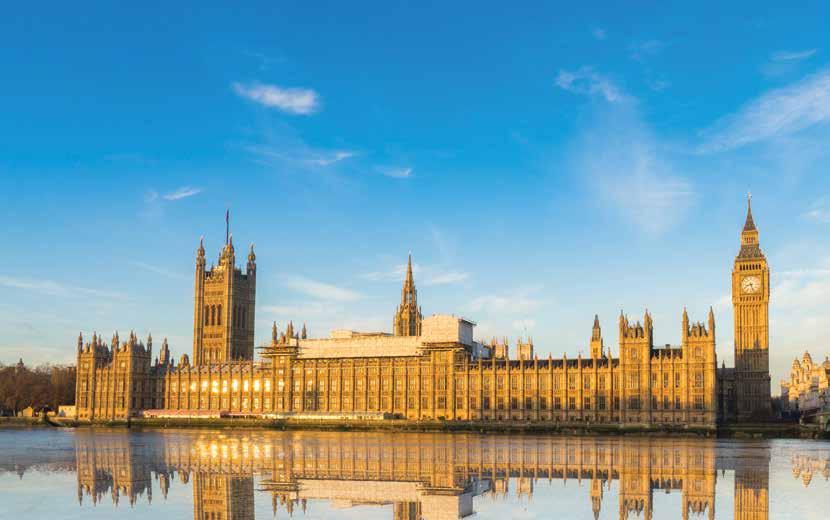Are grandchildren good for your health?
THE MAGAZINE FOR MEMBERS OF THE CIVIL SERVICE PENSIONERS’ ALLIANCE
Housing crisis: campaigning for more and better homes
AGM 2024: special supplement setting out this year’s agenda


Are grandchildren good for your health?
THE MAGAZINE FOR MEMBERS OF THE CIVIL SERVICE PENSIONERS’ ALLIANCE
Housing crisis: campaigning for more and better homes
AGM 2024: special supplement setting out this year’s agenda

Stay one step ahead of the fraudsters


Your son or daughter has lost their phone and needs you to transfer some money to buy a new one... They are using a friend’s phone to text you but you can’t call because the signal is bad... Your bank wants you to move some of your money because there has been suspicious activity...
Scams come in many different forms and it seems that older people are more vulnerable to fraudsters. In our cover feature this issue, Barrie Clement reports on what to look out for and how to protect yourself.
We also shine a spotlight on housing and the difficulties facing older renters in a feature by Jenny Sims.
On a happier note, Helen Nugent looks at the benefits of grandchildren for keeping you active and involved. There can also be a financial benefit for some grandparents too. Let’s forget about the exhaustion!
We also have our regular features, including sadly the last parliamentary synopsis by Joe Frost, who is hanging his notebook up after many years of service. We’re grateful for his hard work and cheerful demeanor.
I hope you enjoy this autumn edition of The Pensioner. We’ll see you again in the winter.

ISSN - 1360-3132

Head Office, Grosvenor House, 125 High Street, Croydon CR0 9XP 020 8688 8418 enquiries@cspa.co.uk www.cspa.co.uk
General Secretary: Sally Tsoukaris sally.tsoukaris@cspa.co.uk 020 8688 8418 NEWS ROUND-UP
Plus a report from the recent ILS Retirement Summit
GENERAL SECRETARY 8
Sally Tsoukaris looks forward to October’s AGM

The quest goes on to improve where older people live
COVER STORY: SCAMS 12
Words of warning – and reassurance –from our fraud-spotting specialist
DEPUTY GENERAL SECRETARY 14
David Luxton on the impact of pop star Taylor Swift on our pensions
GRANDCHILDREN 16
The pros and cons of being an active, involved grandparent
BRANCH AND GROUP NEWS 19
What have members been up to over the summer months? CONNECT 27
New government, new pension policy?


Published by: Square7 Media Ltd
Publisher: Gaynor Garton
Advertising sales: Ethan Hall hello@square7media.co.uk
Editorial production: Kate Wheal
Design and art direction: Charlotte Russell

Winter fuel payments, which have in recent years been paid to all pensioners tax-free, are to be restricted to those on Pension Credit and certain other benefits only this year.
The government announced the change in order to address funding shortfalls, which it said had been left by the previous administration.
CSPA General Secretary Sally Tsoukaris said: “Whilst energy bills have reduced since their peaks in 2021 and 2022, our members and others are finding that prices have remained relatively much
“We call upon the government to widen the net significantly”
higher than they were just a few years ago. We know only too well that far too many pensioners who are eligible to receive Pension Credit payments, and other benefits, are simply not applying for them for a host of reasons, with estimates of the numbers in this category being in the hundreds of thousands.
“We call upon the government to widen the net significantly to ensure that all those who need additional support to be able to heat their homes this winter can benefit from winter fuel payments and not be forced to choose between heating and eating.”
In November 2023, an additional pensioner cost of living payment of £300 was paid with the winter fuel allowance, but it is very unlikely to be applied again this year. Regulator
A delegation including Liverpool MP Ian Byrne and former Australian judge Jocelynne Scutt moved quickly after the election to increase pressure on Sir Keir Starmer over women born in the 1950s, David Hencke writes They called for mediation to end the stalemate in paying out compensation to those who waited six years to get their pensions.
As well as presenting a letter and a petition signed by 36,000 50s women, they appealed to new work and pension secretary Liz Kendall to open talks to sort out the longstanding issue – neglected by both Tories and Labour during the general election.
Tory ministers and Labour shadow ministers kept insisting they needed more time to study the report by the
recently knighted former Parliamentary Ombudsman Sir Rob Behrens, which found partial maladministration over communications to the 3.3 million women, who faced a six-year delay until they reached 66 to get a pension. He recommended up to £2,900 be paid to each to cover maladministration.
The pensions equality campaigning group CEDAWinLAW decided this was not enough as it did not cover past discrimination against women, many of whom had faced hurdles preventing them qualifying for a full pension.
They have insisted that since the UK signed the UN Convention on Eliminating All Forms of Discrimination against Women in 1986, such paltry compensation breaks international law.
Later, Jocelynne Scutt, whose report
Ofgem announced earlier this year that the regulated energy price cap was to reduce to £1,690 from 1 April, down from its peak of more than £4,000.
To check whether you, or someone you care about, may be eligible for Pension Credit, a free TV licence or any other benefits, we recommend the help and advice available from our partners at Independent Age (www.independentage. org/get-advice/money/benefits/ pension-credit or telephone 0800 319 6789) and Age UK (www.ageuk.org.uk/ information-advice/money-legal/benefitsentitlements/pension-credit/ or telephone 0800 678 1602).
Age UK has also started a petition to save the winter fuel payment for struggling pensioners. Please visit www.ageuk.org.uk to sign the petition.

highlighted discrimination against the women, made a strong speech saying it was time for a new government to open talks and settle this dispute.
She praised Chancellor Rachel Reeves for planning to implement a key recommendation promising to implement part of the Equality Act that would gain equal pay for women and men. Future generations would at least earn higher pensions as a result, she said, ending the gap in the private sector for men and women.
Chancellor Rachel Reeves has announced a comprehensive pensions review aimed at improving the financial provision for pensioners and driving economic growth.
The review aims to help channel billions from defined contribution pension schemes into the UK economy, in a move the Treasury says could increase individual pension pots by more than £11,000.

way to reform planning, create a National Wealth Fund and improve stock exchange listings. The review will be led by the first joint Treasury and Department for Work and Pensions Minister, Emma Reynolds. The initial phase will focus on increasing investment and pension outcomes. The next phase will further address retirement adequacy and market investments.

There’s never a dull moment in our busy head office, and we are pleased the colleagues who joined us in the latter half of last year have settled in very well.
The review will explore using the £360 billion in the Local Government Pension Scheme for more productive investments and reducing the £2 billion a year spent on fees.
The announcement preceded the first meeting of the Growth Mission Board, with measures already under
The Chancellor and the Pensions Minister will engage with industry leaders to shape the review. Supportive responses from industry figures highlight the anticipated positive impact on economic growth and pension savers. And legislative moves, such as the Pensions Bill’s value for money framework, aim to enhance governance and returns for pension savers.
Overall, the review aims to ensure better retirement outcomes and to harness the significant potential of the pensions industry to support national growth.


In the CSPA annual report, distributed with the Summer edition of The Pensioner, there were a couple of inaccuracies unfortunately. We would like to make clear that Brian Sturtevant, CSPA President, should have been listed as such on the Who’s Who pages. Also, in the National Pensioners Convention report, it should have been stated that Brian represented the CSPA on the Pensions and Incomes Working Party (PIWP) along with the CSPA’s Chris Haswell. Brian chairs the PIWP and wrote the report of the Convention for The Pensioner.
Marion McAuliffe (pictured), who was promoted to Office Manager in July 2022, has taken partial retirement by reducing her working arrangements to two days a week. Marion retains a key role in our team as Finance and AGM Manager, and she is still responsible for all matters relating to membership subscriptions and the administration of our AGM event.
We are pleased to welcome Lorraine Lydon as our part-time Office Manager. She is working with Marion to look after our office systems and administrative functions, as well as helping to publish and distribute our group newsletters.
Marion McAuliffe has now become our Finance and AGM Manager
The landlords of our Croydon HQ notified us in April of their intention to give up the premises. We will therefore be relocating to an alternative location in early November. We have looked at a number of places and we will keep members updated about our new home. Any changes to our contact details will be kept to a minimum to avoid any inconvenience.
The CSPA is pleased to confirm that the new travel scheme for members was successfully launched on 1 July by the Civil Service Insurance Society. Using travel insurance provider PJ Hayman, the scheme has been specifically designed for CSPA members.
In common with all schemes, there is an eligibility criteria at the time of joining – further details about this can be found at www.csis.co.uk/cspa or via the member
Be assured that CSIS has an alternative available for a wide range of scenarios
benefits page of the CSPA website at www.cspa.co.uk.
We understand that the new scheme may not be suitable for all members, but please be assured that CSIS will have an alternative available for a wide range of scenarios – those who may only take one trip in the year, for example, or those travelling for more than 65 days per trip (which is over the new scheme’s limit).
There will also be options for travellers aged 80 or older and those with medical conditions that do not comply with the ‘fit to travel’ criteria of the new scheme. So rest assured, we have covered all bases.
The friendly team at CSIS can be contacted on 01622 766960. And as the





Clear communication and easy to access...
Clear communication and easy to access online. The policy is precisely what I have been looking for for ages...





We found the application procedure... perfect for our needs
We found the application procedure simple and easy to understand. The lady who I talked to was both patient and informative. The travel policy we took out fits our needs perfectly...
examples above illustrate, the new scheme has had some very good reviews from CSPA members on Trust Pilot.

The
International Longevity Centre has set out the pension priorities for the new government. Jenny Sims reports
The outlook at the start of the recent International Longevity Centre (ILC) Retirement Income Summit seemed bleak for present and future retirees alike, with a stark warning about pensions provision being at a tipping point. But speakers claimed that there was government money available to deal with the pensions crisis – it just had to be distributed differently. And there were plenty of ideas on how the young and old, employees and employers, pension firms, policymakers and politicians could ensure a safe, dignified retirement for people.
Most speakers saw the introduction of pension auto-enrolment more than a decade ago as a success. Keynote speaker Sir Stephen Timms said that this had only been possible because of a cross-party consensus and industry co-operation, and that any future pension reforms would require the same sort of collaboration.
Delegates also agreed that people still weren’t saving enough for retirement. Ahead of the conference, the ILC had published research highlighting significant generational disparities in wealth accumulation. It found that although people fear waning state support for retirement, the under-50s don’t prioritise retirement planning.
Intergenerational contract
The report raised concerns about intergenerational fairness and the future of the “intergenerational contract” by which different generations support one another depending on their resources and needs at different stages of life. It said: “Increasingly, evidence suggests that demographic change, low economic growth and high wealth inequality between the generations are putting this under pressure.”
Underpinning the report was a YouGov survey by the ILC and investment manager M&G in May, polling more than 2,000 people’s perceptions and
ILC: “The generational wealth gap must be addressed – and quickly”
experiences of intergenerational inequalities. It found that:
• Half of the people surveyed felt wealth in the UK is not fairly distributed.
• Across the generations, most people believe government support for older generations is likely to decrease.
• There is a significant appetite for saving across all age groups but, particularly among the young, retirement saving is not seen as a financial priority.
spending
Most people feel government spending on their generation is too low – 71% of over-65s surveyed felt the government spends too little on them and 65% of 18 to 24-year-olds felt the government spends too little on them.
The authors said: “This suggests that simply redistributing government spending across the generations is not going to address these challenges.”
ILC senior research fellow Dr Vivien Burrows said: “The generational wealth gap must be addressed – and quickly –to make sure there’s equitable financial opportunity for future generations. We need long-term policies that take the concerns and circumstances of different cohorts seriously, and don’t just pit generations against one another.”
During a panel discussion on the priorities for the new government, Independent Age CEO Joanna Elson put alleviating poverty first. It was a scandal that more than two million over-65s in the UK were living below the poverty line and one million hovering above it, she said. And without action, this would rise to 3.9 million.
She urged government to make
sure older people claim the benefits to which they are entitled – 88,000 do not claim pension credit. She also called on government to ensure financial security, introduce a social tariff for energy and appoint an Older People’s Commissioner for England.
Mick McAteer, founder of the Financial Inclusion Centre, said the government must ensure people have a decent income throughout their working lives to allow them to save for retirement.
The ILC warned: “We’re at a tipping point. Policy decisions in the next few years will have a significant impact on the long-term retirement income prospects for older people today and in the years to come.”
The consensus was clear: the new government must bring about reform and come up with a sustainable pensions and income plan.

Abig hello to you all. What a momentous summer we’ve had – from the era-defining general election to the ecstasy and agony of UEFA football and the splendour of the Olympic Games in Paris. Whatever you were watching or doing, we hope you had good times to remember as the nights draw in and the leaves start to fall.
Believe it or not, 2024 marks the 10th anniversary of Later Life Ambitions (LLA). We hope to host another parliamentary event in the coming months to celebrate this, and plan to use any opportunities to remind those in government, as well as those on the opposition benches, of the importance of our campaigns.
Before the election, we spent over a year working with our LLA colleagues NFOP and NARPO to ensure election candidates were aware of CSPA priorities and our LLA manifesto Standing Up for Pensioners. And we held a parliamentary event last November, followed by several
Believe it or not, 2024 marks the 10th anniversary of Later Life Ambitions

meetings with MPs, ministers and other decision-makers.
Since the election, we have sent letters of congratulation to new ministers, with the aim of cementing existing working relationships or to introduce ourselves. And we have ongoing dialogue with several new MPs who indicated an interest in our manifesto pre-election.
From speaking to CSPA members round the UK, it is abundantly clear to me that the rising burden of tax on pensions income is a pressing concern, and we are calling on the government to review the frozen tax threshold to mitigate the impact of fiscal drag on older people.
The Institute of Fiscal Studies has recognised older people are the demographic worst affected by having to pay tax on more and more of their
We are pleased to welcome Jonathan Freeman as the new CEO of the Charity for Civil Servants. We work closely with the charity in many ways, to mutual benefit, and have enjoyed collaborating with former CEO Graham Cooper for many years. We wish him well in his retirement.
Our recent affiliation with the Care and Support Alliance (CSA) has yielded fruitful opportunities to campaign nationally for improvements to our social care
systems and support offered to carers. The CSPA was one of 54 organisations signing an open letter from the CSA to the incoming government. The letter was also signed by 24,000 people. As a result, it was profiled by Sky News, the BBC’s Today programme, BBC Breakfast and the One o’Clock News
We have promoted the CSA’s Show Us You Care online campaign to our members to help them find out what is good, and what is not so good, about the provision of care in their local area.
income, from the state or civil service pension and any other occupational pension schemes they’ve paid into.

We are pleased to have played our part in promoting this campaign to the National Pensioners Convention biennale conference in March, to ensure the voices of hundreds of thousands more pensioners echo our demands.
We were pleased to see the three main parties all commit to maintaining the triple-lock throughout the first Parliament before the election, and we will keep up pressure on the new government to make sure their pledges are honoured.
While we must be realistic about the economic pressures the country is facing, and sensitive to the concerns of the generations behind us who believe that the state pension won’t be there for them, we must stand firm in defending everyone’s right to a decent standard of living in later life.
At the same time, we will continue to push back against calls for the raising of the state pension age to be brought forward – 68 is indeed ‘too late’, never mind suggestions that it be increased to 70, or even 80 as one former prime minister has suggested!
We encourage CSPA members to urge their MP and local authority to bring about improvements in social care and support for carers locally.
Meanwhile, our partnership with Age UK has helped it secure a group of MPs willing to speak up for older people’s interests, after more than 33,000 emails were sent to 3,341 election candidates – 500 vowed to be Age Champions if elected.
The examples given here – two of many – highlight people’s power to make a difference and the value of the CSPA teaming up with the right partners to extend our influence.
Our Annual General Meeting on 9-10 October is approaching rapidly, and groups and branches have played their part in drawing our attention to a range of issues of concern to members.
We have received more than 50 motions for debate on topics ranging from pensions to health and social care, public transport and pensioner taxation. We look forward to lively discussions.
We have several proposed constitutional amendments to consider this year, relating to recruiting new members and supporting active local groups in England and Wales, as well as the branches in Northern Ireland and Scotland.
We must also stay in touch with the growing number of members who are not part of open groups. Sadly, this has led to some calling for greater separation within our CSPA ‘ranks’ to address issues that this lack of member engagement in England and Wales poses for our democratic structures. I remain hopeful that our belief in the campaigning strength of unity will win out.
The number of members joining online is significantly up on recent years. But we have much more work to do to ensure the CSPA’s future success is secured.
All members can play their part in letting people they know about the valuable work we do. Please encourage friends and former colleagues to join us.
We invite all members to consider becoming more actively involved if they are not already participating in their local group or branch – they can be
assured of a warm welcome, ongoing comradeship, sociable gatherings and a chance to make a real difference to our campaigns. This year’s AGM will update members on progress made, as well as exploring the concerns raised.
The Labour Party pledged to urgently address the woeful state of our social care system, and we will keep up the pressure on government to face up to the dire need for a properly funded, national social care framework.
They must also consider the need to alleviate problems being experienced by NHS services and the critical importance of providing more effective ways for people to access community-based care. AGM motions look at how the CSPA
We
have received more than 50 motions for debate this year

might best use its influence to effect positive change in these critical areas.
Many older people continue to be negatively impacted in accessing vital services by not having access to the internet. Our AGM will urge the Executive Council to maintain pressure on the government to compel those providing local authority services and utilities and large companies to make services accessible for those without online access. Another motion asks the EC to seek assurances that nobody will be left without access to phone services in the switchover to digital.
The AGM will again address the decline of local and rural bus services and remind us to support the National Pensioners Convention’s National Bus Week campaign for improved services. We will also consider a motion asking the CSPA to campaign for more consistent concessionary fares for pensioners across all transport networks, and another that raises concerns about the dangers of ‘floating bus stops’.
Finally, I have long written about our campaign to appoint a Commissioner for Older People and Ageing in England and Scotland, supported by Independent Age, Age UK and the National Pensioners Convention. The AGM will remind us to continue this work.
• For details on all our AGM motions, see the supplement with this issue.
Individual members have always been able to attend our AGM but in the past have had to meet all their own costs. As the AGM is a residential event, these costs are not insignificant.
The CSPA Executive Council recognises that many of our members are no longer covered by active groups and branches that can send delegates to the AGM
and have offered the opportunity for a limited number of members to attend at a subsidised rate of £70 for an ensuite room on the Wednesday night. This includes all meals and accommodation for a single guest.
Travel costs are not included, but there is a free shuttle bus service from Coventry station to the venue at
Chesford Grange Hotel in Kenilworth, which can be made available.
Any member not covered by a group or branch who is interested in attending the AGM should contact us on 020 8688 8418 or email enquiries@cspa.co.uk . There is limited availability, but those who attend will be able to participate fully. We look forward to seeing you.
No-one disputes that the UK has a housing crisis. The issue was high on voters’ agenda before the general election and, not unsurprisingly, both main political parties pledged to build more homes if voted into government.
But even before the election, specialist campaigning bodies and retirement home providers concerned about the housing needs of older people had produced their own manifestos and recommendations to solve the crisis.
Many were among the 80 stakeholders consulted by the Older People’s Housing Taskforce (OPHT) – set up in May 2023 to look at how to improve housing options for older people in the UK to give them greater choice, quality and security.
The independent taskforce was given 12 months to report back with recommendations – at the time of writing nothing new on the OPHT’s progress had been published on the government’s website since its interim report.
In response to an enquiry from The Pensioner, a government spokesperson confirmed the Department for Levelling Up, Housing and Communities and the Department of Health and Social Care had received the taskforce’s final
report before the end of May – it had not, however, been made public. The spokesperson added: “It will be a matter for a future government to consider the recommendations.”
OPHT leader Professor Julienne Meyer said at the outset that they would be putting people first and consumer protection first, and that they were keen to ensure their findings were grounded in the experience of people who lived and worked in the sector. Hence, they would be engaging and consulting with a wide range of organisations.
Taskforce recommendations
Its early recommendations were that:
1. The government implements measures to protect consumers from hidden fees as soon as possible, based on recommendations developed by the Law Commission in 2017 and accepted by government in 2019
2. The government ensures that older people’s housing is given due consideration and prominence in the forthcoming revisions of the National Planning Policy Framework.
Taskforce members visited several retirement schemes, including: McCarthy Stone’s Runnymede Court, Worthing;
Audley’s Mayfield Retirement Village in Watford; and Extra Care Charitable Trust’s Shenley Wood site in Milton Keynes.
Those consulted included: the National Housing Federation, which represents more than 60 organisations; Age UK; and the Associated Retirement Community Operators (ARCO).
ARCO’s members provide a range of housing options for older people –retirement housing (sheltered housing, retirement housing, retirement flats or communities); integrated retirement communities (IRCs, also known as extra care, retirement villages, housing-withcare, assisted living and independent living); and care homes (nursing homes, residential homes and old people’s homes).
The taskforce excluded care homes from its enquiry.
In February, ARCO published a housing-with-care manifesto for Greater London. Entitled An IRC in Every Borough, it called for all Greater London Assembly (GLA) members and GLA staff, London borough councillors and officials who have relevant portfolios to visit an integrated retirement community in or around London by the end of 2024.
London’s population is ageing. Between 2011 and 2021 some boroughs saw a 20% increase in the number of over-75s.
The ARCO manifesto says: “Specialist housing-with-care can transform people’s lives for the better. It can improve health and wellbeing, delay the onset of care


needs and allow people to stay in their own homes for longer.”
However, the provision of such care in the capital is extremely low (see box). Before the election, many organisations called for a major housebuilding programme. The National Pensioners Convention wants 85,000 sustainable homes for older people.
The Centre for Ageing Better (CAB) said: “A lack of suitable housing options for older people, in the communities they want to live in, is leaving many trapped in homes that aren’t suitable for them.”
The comment followed the publication of analysis by the Care Policy and Evaluation Centre at the London School of Economics and Political Science, whose report, Counting the Cost, said fixing dangerous homes in England would deliver at least £1.5 billion in health and social care savings. Previous research from the CAB has identified £19 billion of annual health benefits from investing more in home improvements.
Meanwhile, Age UK has shone a light on the need to improve older people’s homes. Its manifesto points out that 1.1 million older people live in homes that do not meet the Decent Homes Standard.
The body has called on the government to “expand the social housing sector and promote an increase in and diversification of mainstream and supported housing for older people, especially for those on low and modest incomes”.
And Independent Age says: “Across the UK, more and more people are renting in later life. We want to make sure that all
older people can have a place they love as their home.”
In England alone there are more than 400,000 privately rented households where someone aged over 65 lives. But the charity hears from many who have problems renting for a variety of reasons – spiralling rents, poor-quality housing and the constant anxiety of living in an insecure tenancy.
According to Independent Age’s report Hidden Renters (www.independentage. org/hidden-renters-report):
• 25% of older renters experience longterm poverty (seven to nine years)
• 37% of older private renters experience relative poverty after housing costs
• 70% of private renters aged 65+ in England say they would find it difficult to find an alternative property if they had to move.
The report also says: “Informed by the views of older people living on low incomes who are privately renting, we believe it is possible to reimagine older people’s rental experiences and make a meaningful difference quickly. We believe that any national effort to improve housing must include the voices of older people at its core.”
Its wide-ranging recommendations include that “the UK government initiates a public debate on whether to make decent housing a human right”. Top of its list are recommendations from the Renters Reform Bill, which failed to be passed because parliamentary time ran out before the general election.
In September, a collaboration between the National Housing Federation and the Chartered Institute of Housing will result in a joint Housing Community Summit being held in Liverpool. Social housing will be its
According to ARCO’s manifesto for Greater London, despite 70% of over-75s in the capital owning their own home, 19 of the 32 London boroughs have no housing-withcare homes for older people. The total number of units for older people to move into is just 8,835.
The reasons for such low levels in London are complex but come down to three overarching issues:
• Vision: There has been insufficient leadership in London to tackle the specific challenges associated with expanding provision of housing-with-care.
• Planning: Housing-with-care is not given enough importance in planning policy and decisionmaking in London.
• Affordability: There is insufficient local government support for provision of social and affordable schemes and too few sites are allocated to older people’s housing. It is also challenging in London to develop schemes that older homeowners can afford.
Source: Feb 2024 data analysis from Centre for London. For more information on ARCO, visit www.arcouk.org
main focus. But across the housing sectors there is agreement that a long-term plan for housing and for older people is needed (https://housingcommunitysummit. co.uk/).
Labour has pledged to build 1.5 million homes in five years, as well as new towns across the country. And if the OPHT endorses the recommendations of its stakeholders, the framework for a new long-term plan will be readily available.

We’re seen as easy prey. Cybercriminals smell weakness, a lack of computer savvy and therefore easy cash. Anyone in their 60s or older is disproportionately affected by scams, whether by phone calls and messages or through email. The average age of an email scam victim is 74.
People especially at risk are those who are isolated or lonely, or living with dementia or cognitive decline. These fraudsters take no prisoners.
The vast majority of us who have smartphones and computers attract the attentions of scammers. Some 73% of UK adults (40 million) have been targeted and 35% (19 million) have lost money because of it.
The average amount lost by victims is £1,730, according to National Trading Standards. But estimates of the proportion of victims reporting scams vary from about a third to as little as 5%.
And beware. Someone who has been successfully conned is often targeted repeatedly and added to so-called ‘suckers lists’ shared between scammers.
Deep concern about the growing menace of computer fraud was expressed at the CSPA’s AGM in March. Pensioners are seen as lucrative targets. Following reforms in April 2015 allowing people to access their savings from the age of 55, there has been a surge in pensions fraud.
Basically, scammers are out to get their hands on your nest egg. Either the money will be switched to a dodgy investment scheme or it will simply disappear into their pockets. Don’t let them do it.
The Financial Conduct Authority warns: “If you get a call out of the blue (a cold call) about your pension, the safest thing to do is hang up. It’s illegal and probably a scam. If you get offers via email or text, you should simply ignore them.”
If you have time, the authority asks you to report these sort of approaches to the Information Commissioner’s Office.
Scammers have a million and one ways to get at your money. Barrie Clement outlines how you can spot the fraudsters
The FCA says: if you get a call out of the blue about your pension, hang up
Watch out for calls supposedly from your bank. Scammers might ask for your PIN and tell you to give your bank card to a courier. Your bank would never do this.
Or a supposed technician may contact you claiming your device has a virus and you need to download software to fix it.
This is actually spyware giving scammers access to all your online information.
One way of avoiding being taken in by fraud via your phone is by refusing to answer calls from an unknown number. If the call is legitimate, the person or company will probably leave a message. Thieves tend not to do that.
Calls claiming to be about correcting your council tax band or giving you a rebate are fake. Your council would never call you on such a subject out of the blue.
Another way thieves seek to help themselves to your hard-earned cash is
through investment scams. Again, you will be contacted out of the blue and offered opportunities that seem too good to be true. They seem too good to be true because they are.
You will be put under pressure with time-limited offers. But don’t be rushed – always take professional advice before committing yourself.
Age UK says people should be especially vigilant about investing in cryptocurrency or foreign exchange trading schemes. Most cryptocurrencies aren’t regulated by the Financial Conduct Authority, so they aren’t protected by the UK’s Financial
Services Compensation Scheme. You should also look out for email scams aimed either at stealing your money directly or accessing personal or financial information. The sender of the email may pretend to be a legitimate organisation such as your bank and ask you to log on to a fake website. Clicking on links or downloading attachments sent by fraudsters may damage your device.
Check the sender’s email address. It will be unrecognisable or at least not quite the same as the organisation’s correct address. If it is a scam, there are often spelling and grammar mistakes.
So-called ‘phishing’ emails claiming to be from HM Revenue and Customs offer you a tax refund if you enter your details. The real HMRC would never email to give you a tax refund. In fact, any call from people claiming to be tax officials should be ignored.
In summary, if you receive a suspicious and unexpected email, don’t reply, don’t open any links or documents, just delete it. And report it as spam through your email provider.
You may also receive scams through the post – a letter congratulating you on

New rules coming in this year will ensure fraud victims are compensated
winning a cash prize, for example. Don’t respond, even if they look authentic. A genuine lottery won’t ever ask you to pay a fee to collect your winnings.
If you get a bill from a provider and you’re not sure whether you have an account with them, find the company’s contact details in the phone book or online and ask them directly.
A longstanding scam involves strangers claiming to have lost all their money in unfortunate circumstances or saying they need to pay for an operation and asking you for money. These stories are fake.
You may receive a letter that tells you someone has left you money in their will. The letters may mention real law firms and even have seemingly genuine email addresses, postal addresses or websites. If you receive a suspicious letter, simply throw it away.
A scam invariably affecting older people involves equity release. Many
readers of The Pensioner will have most of their money tied up in their home, so it can be tempting to convert some of that into cash. Worryingly, the Age UK name has recently been used by scammers offering such a service. But although the charity offers independent advice, it doesn’t offer equity release. Always check such schemes with a qualified adviser.
Some of us have been called by a scammer asking about a car accident you’ve supposedly had, claiming you may be entitled to compensation. Don’t engage with the caller. If you’ve had an accident, call your own insurance company on the phone number provided on your policy.
Texts are sometimes sent by scammers asking you to follow a link to fix a problem with one of your accounts or to track a parcel. These links will often take you to a fake website and get you to log in, which scammers can then use to access your information.
Conmen can even mimic an official telephone number, leading you to believe the caller is from a legitimate organisation, such as a bank or utility company.
Just because someone knows your basic details doesn’t mean they’re legitimate.
And scammers can keep your phone line open even after you have hung up. Use a different phone or wait 15 minutes between calls to make sure they are no longer on the line.
There are new attempts to ensure fraud victims are compensated. Under rules coming into force this year, banks will be under stricter rules to reimburse people who have lost money.
But it’s amazing how platforms such as Google and Facebook get away scot-free with enabling and transmitting these scams.
It has not gone unnoticed by the banking sector. UK Finance, which represents banks and other financial firms, is calling on the government to bring in legislation to force big tech and social media companies to spend up to £40 million a year on reimbursing customers and fighting fraud on their platforms.
For these mega companies, that’s small change, but it could persuade them finally to take some responsibility.
Additional
reporting by
Rosemary White
•Independent Age –order the charity’s Scamwise leaflet by phone on 0800 3196789 or online at https://www. independentage. org/get-advice/ scamwise

• Stop Scams UK – a membership organisation that brings together responsible businesses – 5 Fleet Place, London EC4M 7BD, https://stopscamsuk.org.uk
• To prevent phone and online fraud, visit Take Five https:// www.takefive-stopfraud.org.uk
• How to spot a scam – free service from Which?, visit https://www.which.co.uk/ consumer-rights/advice/howto-spot-a-scam-alFiz5h8mnJ9
• If you’ve been a victim of fraud, contact Victim Support at https://www.victimsupport. org.uk or call 0808 168 9111
• Friends and family
• Police
• Action Fraud on 0300 123 2040
• Your bank’s fraud team –phone number on the back of your debit card
• If a scammer has asked you to install any software, this should be removed. A friend could help
• Report scams by text on 7726
• A scam impersonating an organisation should be reported to the organisation itself. Most companies have information on their websites

September marks the end of summer and the start of a new term – and what an eventful time it has been since I last wrote. Along with the general election and a lot of sport, we had a great summer of music with the Glastonbury festival and a sell-out UK tour by Taylor Swift in June.
To many pensioners, a tour by a talented US singer/songwriter wouldn’t attract too much attention – but in this case it could affect your pension increase. In July, financial paper AM reported on a leading economist saying: “The Taylor Swift summer tour could hamper Bank of England efforts to tame inflation and delay an anticipated cut in interest rates.” Apparently, this is due to the impact of the singer’s tour on hotel prices and in the wider hospitality sector, causing serviceindustry inflation to stay stubbornly high.
The rate of inflation is directly relevant to pensioners. As it is an element of the state pension triple-lock, it also determines the annual rise in civil service pensions, based on the September Consumer Prices Index (due in mid-October). So Taylor Swift’s tour really could affect how much your pension will rise from next April.
Pensions and the amount of tax paid by pensioners

became a big topic of debate during the general election campaigning. Rishi Sunak repeatedly pledged that as part of his plan for a ‘triple-lock plus’, tax would never be paid on the state pension. However, this pledge overlooked the fact that more than 8.5 million pensioners aged 66 and over already pay income tax, according to the latest HM Revenue and Customs data.
This means that more than 70% of the 12 million people receiving state pension already pay tax due to the frozen income tax threshold of £12, 570. And the proportion paying tax will rise further each year as pensions increase.
Currently the highest rate of the new state pension is £11,502 a year (£221.20 per week), which is 92% of the basic tax threshold, leaving only £1,068 of headroom before tax becomes payable.
By contrast, in the 2019/20 tax year, the highest rate of state pension was at 72% of the then tax threshold, leaving £3,732.80 headroom before
So, it’s no wonder that more and more pensioners are now paying tax on their pensions, caught up in the growing ‘fiscal drag’.
reported in June, the fiscal drag has amounted to one of the largest tax rises in history, bringing into the Exchequer an extra £40 billion a year. So it’s unlikely that the new government will re-introduce index-linking of the tax thresholds in the Autumn Budget Statement expected in late October. However, it is of major concern to many members, who are
feeling the impact on their net pension payments. The CSPA will continue to campaign with the new government for the thresholds to increase in line with inflation, in conjunction with our partner pensioner organisations in Later Life Ambitions.
The growing burden of tax on pensioners was raised by the CSPA at the National Pensioners Convention (NPC) policy conference in March, and will be highlighted at the NPC’s annual conference in Blackpool on 3-4 September.
The growing tax burden was raised by the CSPA at the NPC policy conference
The new Chancellor Rachel Reeves’ Autumn Statement at the end of October will give us all an insight into what plans the new government has on tax and spending priorities.
We will also know by mid-October what impact Taylor Swift had on the September inflation rate, when the Office for National Statistics publish the annual rise in CPI that determines the increase in civil service pensions from next April.
Tax on pensions is one of the many topics for debate at the CSPA national AGM to be held on 9-10 October in Kenilworth. The motions for debate at the AGM are set out in the supplement included with this issue of The Pensioner
The AGM gives local groups, branches and individual members the opportunity to set CSPA policies for the coming year. This year, 54 policy motions were submitted, covering a range of issues –the state pension, health and social care, transport policy, including the Better Buses campaign, and national standards for concessionary travel arrangements.


One of the issues to be debated is about the announcement last November of the award of a government contract to Capita for the administration of the civil service pensions scheme from December 2025.
A motion for the AGM submitted by Bedford and District Group calls for assurances from the Cabinet Office and Capita to protect data security and ensure no diminution of service during the handover from MyCSP to Capita – as was the case in 2014, when My CSP was awarded the current contract, leading to a National Audit Office investigation and report in 2016.
The CSPA has already been in discussions with the Cabinet Office following the announcement of the contract last November.
We have been told of their requirements for the new provider to introduce innovative and transformational improvements to the service offered to pensioners and working members covered by the civil service pension scheme.
In late May, General Secretary Sally Tsoukaris and I were invited to attend the Cabinet Office Regional Employer Forum in London, where we were introduced to the senior Capita team and the Cabinet Office pensions policy team.
MyCSP will continue to administer the pension scheme during the transition period, under the direction of the Cabinet
The summer round of CSPA regional meetings has been useful in bringing together local group representatives and discussing our campaign priorities and organisational challenges.
I was pleased to attend the North-East regional meeting in Darlington in late May (pictured top), then the Midlands regional meeting in Birmingham in June (pictured left) and the North-West regional meeting in Manchester in July.
All were well represented by local groups and had in-depth discussions on current CSPA campaign priorities on pensions, health and social care and digital exclusion, and ideas to get more members engaging with local groups and attract new members to the CSPA.
Office. We will be having more detailed discussions with Capita as we get closer to the changeover in December 2025.
In the meantime, it is ‘business as usual’ with no change to the current arrangements for the 1.5 million members of the pension scheme.
Information about the civil service pension scheme can be found at: www.civilservicepensionscheme.org.uk.
The number of local groups represented at the AGM has been reducing over the past few years as groups have closed since the pandemic in 2020-21.
We have decided to retain the format of an annual in-person AGM
A Working Party was established by the Executive Council at the beginning of the year to review AGM arrangements and representation from October 2025, as reported in the Spring issue of The Pensioner, which prompted several members to send in their views.
The final report of the Working Party has been issued to local groups in Circular GC 958 and is also available to read in the members’ area of the CSPA website www.cspa.co.uk.
The focus of the review has been to improve the existing opportunity for members who are not covered by a local group or branch to attend and participate in the AGM (see General Secretary’s report, page 8).
We have also decided to retain the format of an annual in-person meeting and ruled out alternate year online AGMs.
Finally, the election of a new government in July gives fresh impetus to our campaigning, with so many new MPs and ministerial appointments.
We are working closely with our Parliamentary advisers at Connect in Westminster to engage with MPs from all sides on issues that matter to our members – pensions policies, health and social care, digital exclusion, transport and preventing state access to pensioner bank accounts.
It will be a busy Autumn but a useful opportunity to promote CSPA policies for the benefit of all our members.
A week is a long time in politics, as Harold Wilson said back in the 1960s.
Taylor Swift sang about a fortnight being forever – so just think of the opportunities for influence we have at the start of a fiveyear parliamentary term.
Governments may come and go but, like the civil service, the CSPA will always be there and looking out for your interests in retirement.
Most children love spending time with their grandparents. And grandparents benefit from being with their grandchildren too. While parents are safe in the knowledge that their little ones are in capable hands, grandmas and grandpas can take comfort from research that shows babysitting their grandchildren improves brain health, provides social connections and helps activity levels.
Time spent with the grandkids can also give life an extra sense of purpose and meaning. According to a study from Johannes Gutenberg University in Germany, which analysed nearly 15,000 people aged 50 to 80 – a third of whom became grandparents – looking after a child in later life could have positive effects on mental and physical wellbeing.
As part of the research, grandmothers close to their children completed a memory test before and after having grandchildren. It transpired that, on average, women did substantially better in specific tests after becoming a grandma.
Caroline Abrahams, charity director of Age UK, says studies like this echo what the organisation hears from older people. Previous polling by Age UK found that the vast majority of grandparents who provided regular care for their grandchildren felt huge benefits from spending this time with their grandchildren. They felt it kept them physically and mentally active, prevented loneliness and gave them a sense of purpose.
“Grandparents can provide a range of
support, many of them playing the role of confidant for grandchildren with worries or problems,” she says.
“Some grandparents tell us they find themselves asked for advice and practical tips, such as recipes and how to mend things, as well as offering a sense of history and identity. In return, many have
Time with grandchildren keeps people physically and mentally active
said their grandchildren are able to help them by providing practical help, such as support with technology if they need it.”
Increased longevity and better healthcare mean that, among other 21st century factors, around nine million grandparents spend, on average, more than eight hours a week as child carers. But there’s also a considerable body of evidence showing the impact of loneliness and social isolation on health.
Jess Doyle, head of impact at the charity Re-engage, which supports older people, says that in 2023 they conducted a short study to understand what brings joy to older beneficiaries. Nearly threequarters said socialising was key, and just over a third said socialising with family.
Doyle says: “An important finding from our study was that our older people said socialising does not have to be in person;
Helen Nugent weighs up the pros and cons of being an active grandparent
many enjoy phone calls and letters. Of those who mentioned socialising with family, 14% specifically spoke of their grandchildren.
“Based on our preliminary insights, we suggest it is very important for the older generation to have regular contact with relatives and friends.”
Family support
As well as building strong bonds with grandchildren, caring for them can help the grandparent in terms of being more active. After all, it’s impossible to be with a toddler or a child under 10 without running after them and being fully immersed in their lives.
Along with the increased mobility and long-term health benefits comes a financial advantage for the family as a whole, as Helen Morrissey, head of retirement analysis at Hargreaves Lansdown, explains.
“Data on the MoneyHelper website puts the average cost of sending a child under two to nursery part-time at over £7,000 per year, while afterschool clubs can cost £67 per week on average. Such figures can put an enormous dent in people’s budgets, so having a grandparent available to help is especially valuable.”
Research by over-50s specialist SunLife found that 53% of the UK’s grandparents provide some form of childcare for their grandchildren.
SunLife chief marketing officer Victoria Heath says: “Cooking and providing meals, cleaning up and babysitting in the evenings are just some examples of the support grandparents offer which, added up,
averages over 22 hours of free childcare a week. If paid for this time, they would receive an annual salary of £13,188 – more than getting the state pension again.
“We also found that 81% of grandparents regularly spend their own money during childcare hours. Food and snacks, materials for activities at home, and activities out and about contribute to just under £80 spend a week, adding another £4,138 a year to their bills. For those also providing free childcare, this rises to an average of £105 a week.”
Soaring childcare costs mean many working parents struggle to find an affordable solution. That’s where grandparents play a vital role, taking up some or all of the slack and stepping in to help care for the grandchildren.
Clare Moffat is a pensions specialist at Royal London, the largest mutual insurer in the UK. She warns that stopping work early to care for grandchildren will have a financial impact, both in terms of loss of salary and benefits, but also for retirement.
“At a time when, for many, the mortgage might be paid and they could be earning money that could go into pensionsaving, grandparents who stop work to look after grandchildren won’t be reaping the benefit of earning while mortgagefree. They may end up accessing their pension earlier than planned, using their pension to live on as they’re no longer working.”
While most grandparents don’t focus on the financial bottom line, these issues a definitely worth considering, particularly if they are yet to receive their state pension.
Morrissey explains: “If you are a grandparent under state pension age and you are looking after a child under 12 so their parent can return to work, you can get help building up your state pension by claiming what is known as specified adult childcare benefit.
“These credits work by transferring the weekly National Insurance (NI) credit a parent or carer gets, as the
child benefit recipient, to an eligible family member. They can help stop gaps in your NI record that could affect your state pension entitlement.”
There’s a general lack of awareness about how grandparents can benefit financially in terms of their state pension. Record-checking and claiming legitimate entitlements are extremely important.
Moffat says: “Claiming credits involves working parents giving up the child benefit credits they receive and donating them to the grandparents, but grandparents and parents must apply for them to be transferred.”
She adds: “Few are aware that NI credits can be claimed for looking after grandchildren, and even fewer – only about one in 10 of over-50s – have actually tried to claim them.”
Financial responsibilities aside, however, too much childcare, particularly for those with health challenges, may not suit
everyone, particularly those who have to carry on working too.
Abrahams from Age UK says: “With all family relationships, there needs to be give and take, understanding and open communication when it comes to talking about what is and isn’t achievable when it comes to caring for grandchildren.”
But she adds: “It’s important to recognise how crucial strong relationships with grandparents are for many children and young people. Especially if things aren’t going well at home or school, being able to confide in a grandparent, who they know loves them unconditionally, is a huge boon as they are growing up.”

Few are aware that NI credits can be claimed for childcare

Scarborough & District
The committee and group continue to meet four times a year and between eight and 10 members attend group meetings.
Regional Representative Andy Aitchison was the speaker at the April AGM and updated us on what was occupying the minds of those at HQ.
There were no new volunteers for the committee, but there were some changes in roles:
• Joyce I’Anson continues as chair –email: j.ianson125@btinternet.com
• James Howie continues as treasurer and takes on the membership secretary role – tel: 01751 475659 email:jpearsonhowie@gmail.com
• Richard Kilsby takes over as minutes/ newsletter secretary – tel: 07783 941589, email: richkilsby@live.co.uk
• Sheena O’Connell continues as a committee member and prepares the group’s entry in The Pensioner –tel: 07702 060063 email: oconnellsheena@gmail.com Any changes to membership details should be reported to James Howie or direct to HQ (tel: 02086 888418 or
We have been looking into ways to overcome digital exclusion
email:enquiries@cspa.co.uk). But feel free to contact any member of the committee, who will help if at all possible.
Richard Kilsby has been investigating the facilities available to overcome digital exclusion. There are digital mentors based in Scarborough Central Library, two in Newby and Scalby and one in Eastfield. For those requiring help with access to wifi/computers and who live outside those areas, it may be worthwhile contacting your local library/council to
check what facilities are available.
Yorkshire Building Society (YBS) has partnered with Citizens Advice to support people facing problems because of the cost of living, for example, by hosting their expert advisers in some local communities.
You do not need to be a member of YBS to take advantage of this facility.
The contact at YBS is Dean (tel:01723 821188 email:scarborough@ybs.co.uk).
We hope you all had a good summer.

Staithes, North Yorkshire
Bournemouth & District
We continue to meet in the lounge of at St Mark’s Church, Bournemouth, which is a pleasant modern venue with excellent facilities, including good disabled access and toilets. We have a varied future programme, including talks on:
• The Work of Mercy Ships – the world’s largest charity-run hospital ships take lifechanging medical care to the world’s poorest
• Dorset countryside – talk with a local photographer’s beautiful slides
• Court Shoes to Combats – a fascinating illustrated talk about one woman’s long and varied army career round the world
We have many other wideranging topics lined up too. All details will be in our local newsletters. We would love you to come along and join us, especially if you haven’t been before.
Secretary: Liz Malin, Harvest Cottage, North Street, Winterborne Kingston, Blandford Forum, Dorset DT11 9AZ Tel: 01929 472441 Mob: 07534 438717 Email: lizmalin1@gmail.com


Attendance at our monthly programme of meetings continues to increase. These take place on the second Tuesday of the month, commencing at 10.30am at Ruskin House, Coombe Road, Croydon CR0 1BD.
Brief reports on CSPA activities nationally and any current local matters of concern are normally followed by lively debate. Recent guest speakers have ranged from the local police, talking about crime and crime prevention measures, the Vision Foundation and a follow-up on interpreting the English country church.
Topics for later in the year include the work of the Croydon Natural History and Scientific Society, the Air Ambulance and Wildlife along the Wandle.
Our 2024 AGM took place on 9 April and we were delighted to welcome General Secretary Sally Tsoukaris as guest speaker. Sally outlined some of the work CSPA had been doing, particularly in relation to our campaigning strategy. She also reported on progress towards making the CSPA a more attractive organisation. Her talk was well received.
Our eight-strong committee was reelected and motions for the national AGM were discussed. A number of members later went on to lunch at a local restaurant.
We were delighted to welcome Sally Tsoukaris to Croydon’s AGM in April
Our group already covers the borough of Croydon and half of Sutton, but we are in the process of extending our services to members in other parts of Sutton who are not currently covered by an active group. Group Secretary: John Hickey, 244 Demesne Road, Wallington, Surrey, SM6 8EL Tel: 020 8773 0496 Email: johnphickey1954@gmail.com
Twickenham & District
We meet on the second Friday of selected months in the Parish Hall of St Mary & St Alban, Langham Road, Teddington, from 11am to 1.30pm. The hall is near St Alban’s Church, which is also the Landmark Arts Centre, the impressive church at the river end of Teddington High Street near the junction with Kingston Road, Manor Road and Ferry Road. The 281, 285 and R68 buses stop here. Langham Road is off the High Street at this point. The meeting room is the Mina Hogan room on the ground floor which is accessed by the wheelchair ramp on the side of the building. Tea and coffee will be available. The remaining dates for 2024 are:
• 13 September: illustrated talk on Hampton Court by Ian Franklin, former warder at Hampton Court
• 13 December: Alice in Wonderland by Gerald King, presented by Paul Leonard, chairman of the York House Society. Secretary: Mr R Monk, 40 Park House Gardens, Twickenham TW1 2DE
Tel: 020 8288 1910
Email: mrbobmonk@yahoo.co.uk
I took up the position of Midlands Regional Representative in November 2023. As a new member of the CSPA, I have been busy meeting the active groups within my region and getting to know the many experienced members within those groups. The Midlands currently has four active groups:
• Birmingham – meet in Birmingham city centre
• Gloucestershire – meet in Cheltenham
• Leicestershire & Rutland – meet in Oadby
• West Mercia – meet in Worcester, Shrewsbury, Hereford and Wellington. All meet regularly, with friendly and informal gatherings which are a great way for CSPA members to find out the latest news and enjoy social events. If you live in or close to one of the above groups, I’d strongly urge you to go along to one of their meetings.
Unfortunately, I’m also aware of the significant numbers of CSPA members in the Midlands who do not live in an area covered by an active group. This can significantly weaken your voice in the democratic conduct of the CSPA’s business – for example, in preparing motions for the AGM or voting for membership of the EC. There are four closed groups in the region:
• Coventry & Warwickshire
• North Staffordshire
• Nottingham & Derby
• Oxfordshire
I appreciate that for members in these areas, the distance to travel to an active group meeting is prohibitive (though you would be made very welcome). So I’m keen to hear from anyone interested in restarting groups (especially Nottingham, where I have an interested contact) or just meeting with me and other nearby CSPA members for a news update. Please contact me if you would like me to arrange a meeting at your local branch of JD Wetherspoon or a suitable coffee house. I look forward to seeing you soon.
Regional Representative: Kevin Billson Tel: 07827 320 413
Email: kevinbillson@ntlworld.com
Gloucestershire
The highlight of the past couple of months was the group outing cruising on the Boadicea II on the Gloucester and

Sharpness Canal. We had a really nice sunny day, a rarity at the time of writing. There were 29 of us and we sailed down the canal to admire the new blocks of flats built of the site of the old warehouses, silos and the Monk Meadow oil depot. They have done a very good job and the buildings are in keeping with the surrounds. There was an excellent commentary and entertaining jokes and stories on the way back to the Waterways Museum, where a cream tea was awaiting us. All in all, a perfect day.
At our June meeting we discussed
Gloucestershire members had a nice, sunny day cruising on the canal
nominations and motions for the AGM in October and concluded the group should raise a motion on the need for a Commissioner for Older People. This would be for someone to be a ‘tsar’ for older people who could bridge government departments, NHS, social services, work and pensions and try to get them to work better together.
We welcomed two new members to the meeting, when the speaker was Amey Harris from AgeUK. She gave out a folder, What matters to me, a personalised care and support plan where we write down how we wish to treated as our health deteriorates and in the later stages of life.
This will be further discussed at our meeting on 5 September, when Dr Ian Donald, a retired geriatric consultant at Gloucester Royal Hospital, will be talking about age and fragility and how to make
the best of them as we get older. On a lighter note, our meeting on 5 December will be a talk on railways by Peter Berry entitled ‘And the wife came too’. As his wife accompanied him on his rail trips, there will be something for everybody. Mince pies will be provided.
As usual, our meetings begin at 10am for 10.30am with refreshments at the Civil Service Club, Tewkesbury Road, Cheltenham GL51 9SL.
Chair: Alastair Goldie, tel: 01452 417846 mob: 07796 341104
Leicestershire & Rutland
We meet quarterly at the Royal British Legion Club, 4a Wigston Road, Oadby, Leicester LE2 5QA from 2pm to 4pm. Our most recent meeting in July included guest speaker Dave Andrews, formerly of BBC Radio Leicester, who gave a presentation on 100 Years of Auntie – A History of BBC Radio and Television.
We published newsletter 40 in May with a report of our group AGM and a list of contact details for the newly elected group committee. A further newsletter is scheduled for August. If you live in the Leicestershire & Rutland area but are not receiving our local newsletters, please contact me (details below) so I can check your contact preferences recorded.
New members are always welcome at our meetings, as are longer established members who have never been before for whatever reason. We are a very relaxed and friendly group and will be very pleased to see you. If you’d like more information about our group and meetings, please get in touch using the contact below.
Secretary: Kevin Billson Tel: 07827 320 413
Email: kevinbillson@ntlworld.com


Members meetings continue be held in Glasgow at The Griffin public house, 266 Bath Street, Glasgow G2 4JP, opposite the King’s Theatre.
There is an entrance to the private room in Elmbank Street for those not wishing to go through the bar. Meetings are usually held on the first Thursday of February, May, September and November. The start time will remain at 1.30pm.
The next branch meeting will be held on 12 September, which is the second

Thursday of the month. If you have any membership matters you wish to update, such as a change of address, please contact me using the details at the end of this report.
Branch newsletters have helped keep members informed of matters of interest, especially those in remote areas who cannot attend meetings or have no internet access.
Word of mouth is one of the best ways of recruiting new members, so if you know anyone who would like to join, please contact Michael Kirby to see if they are eligible – email: Michael.Kirby@cspa.co.uk tel: 07969 405263.
You can also check out the branch website at www.cspascotland.org.uk
If you know anyone who would like to join, please contact Michael Kirby
Special notice: contact details
Apologies to any Scotland Branch members who have not received previous copies of The Pensioner magazine or the branch newsletters.
If any members reading this notice know of anyone still not receiving these, please ask them to contact head office on 020 868 8418 to report it, giving your name, address and, if known, membership number, as the branch officers are not responsible for the distribution listings taken from the national database.
Scotland groups
All previously announced, groups in Scotland are now closed. However, should any members wish to make further enquiries about creating a new group in your area, please contact the branch administrator, Christine McGiveron: 12 Benmore, Prestwick, Ayrshire KA9 2LS tel: 01292 891033
email: Christine.McGiveron@cspa.co.uk
CSPA General Secretary Sally Tsoukaris, along with Northern Ireland Branch Secretary Tony McMullan and Treasurer Roisin Lilley, met NIPSA GS Carmel Gates and DGS Maria Morgan in the union’s Belfast headquarters in late April. It was an ideal opportunity for both sides to get to know each other and for the CSPA to thank NIPSA for providing the CSPA’s Northern Ireland Branch with a meeting room and photocopying facilities, as well as the use of NIPSA’s office address as the CSPA NI postal address. It was a positive exchange of views.
CSPA NI Annual Report
The branch has produced a hard copy annual report of its work from April 2023 to March 2024. An online version will shortly be placed on the branch’s website. However, there are still a small number of hard copy versions. If you’d like one, email branch secretary Tony McMullan: tony.mcmullan@outlook.com
National Vice Chair election
The branch nominated its Treasurer/ Membership Secretary Roisin Lilley to contest the vacant post of national CSPA Vice Chair. We were thrilled to learn that Roisin won the election. Knowing her as we do, we’re sure she’ll prove to be exceptional and hard-working in the role.
CSPA NI website
Discussions with head office have recently concluded about our requirement for a completely new look for our website. It is hoped that the work to change from the existing website will begin shortly. Watch out for some exciting new developments!
Legal offer
The legal offer negotiated with McCartan Turkington Breen Solicitors for exclusive deals for CSPA NI members has continued to pick up interest. The deal provides for free wills, a free initial 20/30-minute
phone consultation on any legal matter and discounted rates for power of attorney and estate planning. Interested? Please contact marie.annemcveigh
The CSPA NI Specsavers deal continues to be highly sought after. Since the last edition of the Northern Ireland newsletter in April, a further 30 members have sought a voucher, saving them £20 on the Specsavers £99 and above range.
This means that 198 members have requested a voucher, saving them a total of £3,960. To get one for yourself, family members or friends contact Tony McMullan at tony.mcmullan@outlook.com
CSPA insurance partner the CSIS has pulled out of offering car insurance to Northern Ireland members because brokers are refusing to give quotes for customers here, allegedly because of the high cost of claims. As a result, CSPA NI are having urgent discussions with other insurance companies. Watch this space.
CSPA NI took part in a very positive meeting with NIPSA in April
The branch has decided to send Harry Baird as its delegate to the AGM and send the Branch Chair Stan Blayney as an observer. Roisin Lilley will be there as national Vice Chair and Tony McMullan will attend as the Northern Ireland representative on the national CSPA Council.
We have sent three motions to be debated on: the ‘triple-lock plus’ idea enshrined in the Conservative Party’s general election offer; accountability for decision-making in care homes etc; and on dementia care.
CSPA NI had its annual meeting with senior representatives of Civil Service Pensions Branch at its Waterside House HQ in Derry/ Londonderry recently.
The branch was represented by Tony McMullan and Roisin Lilley, who were delighted to be joined by CSPA Pensions Officer Chris Haswell.
Among the subjects discussed were the McCloud judgement and its implications, pensions overpayments, annual benefit statements and the outcome of the Walker/Goodwin cases.




Anew government brings exciting opportunities to Later Life Ambitions’ campaign. As Prime Minister Sir Keir Starmer assesses the policy landscape, his new administration offers a chance for LLA to present its campaigning asks to new ministers.
The first six months often dictate the direction of travel of a government, so highlighting the importance of later life issues to ministers early on is crucial.
The issue of timeliness becomes more pressing when we consider that by 2030 there will be almost 13 million people in later life nationwide.
Marking a clean break from 14 years of Conservative Party rule, the new Labour government has an opportunity to quickly establish it will act to support pensioners rather than pigeonhole them as a burden on the rest of society.
Although the government has only been in post for a short period, there are welcome signs that the administration will be a much-needed ally to pensioners.
Here we take a look at the new government’s stances and where they overlap with the calls made in the LLA Pensioners’ Manifesto:
1. UK government to create an Older People and Ageing Commissioner for England and Scotland
2. National social care service integrated with the National Health Service that remains free at the point of delivery
3. UK government and devolved nations to combat digital technology’s role in social exclusion and access to services
4. All political parties to make manifesto commitments to guarantee the state pension triple-lock for at least the duration of the next Parliament
5. All new homes to meet the Lifetime Homes standard, with a national strategy for more adaptable, accessible homes across all tenures
6. Investment in bus and rail services for uprated concessions and improved accessibility and assistance for older people on all new stock and facilities.
Unfortunately, Labour did not commit to installing an Older People’s Commissioner for England and Scotland in their manifesto. Yet a commissioner –as we have seen in Wales and Northern Ireland – has the potential to ensure governments address the policy challenges older people face in a way that best suits their needs.
We will continue to make the case for the Prime Minister and his Cabinet to seriously consider the merits of creating such a commissioner.
On social care, the government looks to have taken the initiative early, having pledged in its manifesto to create a National Care Service. The appointment of Stephen Kinnock as social care secretary is welcome. Like many of us, Mr Kinnock has experience of the impact of dementia on families. He lost his mother, former minister Glenys Kinnock,
On social care, the new government looks to have taken the initiative early
to Alzheimer’s Disease in 2023. As such, the need to urgently reform social care resonates with him.
New health secretary Wes Streeting, himself an avid supporter of a National Care Service, has meanwhile announced a review into NHS productivity.
While it is important to recognise shortcomings in the NHS, the government must ensure that any overhaul of the service remains true to the principle of the NHS being free at point of use.
Turning to digital, new science, innovation and technology secretary Peter Kyle may prove sympathetic to LLA’s asks. He spoke out about the dangers of digital exclusion for those in later life, telling London Tech Week in his shadow role: “The route to greater productivity, increased participation and
improved access to public services relies on every citizen being equipped with the confidence, devices and skills to use the technology.”
Even if online confidence is addressed, online services remain difficult for many older people to access. LLA will continue calling on Labour to follow through on their manifesto promise to grant regulators new powers to significantly boost the number of banking hubs on Britain’s high streets.
LLA also welcomed the commitment to retaining the triple-lock on the State Pension. We hope new pensions minister Emma Reynolds can keep up Labour’s commendable early work.
With her crosscutting role, straddling both the Department for Work and Pensions and HM Treasury, she could facilitate a joined up approach to pensions policy across Whitehall.
Retirement housing, meanwhile, continues to be a crucial issue for those in later life. Despite impacting many people nationwide, the matter has not featured in Labour’s maelstrom of housing announcements.
New transport secretary Louise Haigh enters office with Labour pledges to ensure quality and accessible transport. As with housing, the promises are ambitious – but do not offer specific pledges on accessibility for older people.
In areas where the new government has announced ambitious early plans, but not directly addressed the concerns of older people, LLA will champion your needs to ensure they do not go unheard.
This post-election period will set the tone for years to come, and we will work to ensure that early promise continues and missing pieces are addressed.
• Matthew Boyd is a senior account executive at the CSPA’s public affairs consultancy, Connect.

Paul McCartney’s 1967 song is a far cry from the struggles faced by pre-retirees today, says a recent Fabian Society report. By
Chris Haswell
When you hear about ‘older people who are poor’ you don’t always expect those people to be younger pensioners. It may surprise some to learn that the highest poverty rate of adults falls between the ages of 60 and 65. Researchers for the Fabian Society put it down to the rising state pension age (currently 66) and means-tested pension credit increasing more than working age benefits.
In the same age group, more than a third live in households with assets over £1 million, almost a third have a second home, and more than half live in owneroccupied mortgage-free homes.
So why are so many in this age group in trouble? Some are disabled and not working, and 21% live in a rented home. And private rents have soared, with the added worry of tenancy insecurity.
In public policy terms, people are deemed to be either pension age or in work. In theory, 60 to 66-year-olds should be working. But half of over-60s stop working before they can claim their state pension, and not always by choice.
This is a major cause of poverty as it is much harder to find a new job when you are over 50. In-work benefits are inadequate. The over-60s have a lower hourly rate when in employment and are more likely to work part-time.
In Scotland, a study has shown women try to help their family by caring for grandchildren or giving financial support. Although age discrimination is outlawed, employers are reluctant to take on staff nearing retirement age.
So, what is the answer? The takeup of working age benefits in this age group is poor, with less than half of those eligible claiming them. And occupational pensions are often inadequate. The indication is that people have stopped work too early, though this may have been through redundancy or ill health.
Sometimes people don’t realise how
much they need to live on before state pension age. The people in this difficult position are more likely to be disabled, single, in a caring role, living in rented accommodation, having less/no formal qualifications, and in a minority ethnic group. Women are more likely to be in poverty than men.
This is not likely to change. Research shows an increase in people living longer in poor health, and the state pension age will rise again in 2028. More people will rent, fewer are in defined benefit pensions and there is a lower birth rate for workers to pay state pension.
What should happen?
When researchers asked people what would improve the situation, they said flexible working, financial considerations and help with health difficulties – all factors that affect whether they work or not after the age of 60.
The Fabian Society concludes that support for this group should start early and continue through their working life. The researchers work on the assumption that the state pension age will carry on rising to the age of 68. They argue we need better health and jobs, lifelong learning, careers support, more pension savings and stronger social security.
Support needs to come from two directions: help to work longer and better financial support for those who cannot continue working.
Research from Independent Age bears out these findings. At a recent event attended by CSPA General Secretary Sally Tsoukaris and me, individuals spoke out about the issues they were facing.
And now that they are involved in a campaigning organisation, they are
more positive about getting a better deal in future.

The CSPA is involved in supporting Independent Age to campaign for a better deal for all pensioners, including those who have technically not yet reached state pension age.
If this article has raised any issues that you are worried about, Independent Age has a helpline for older people – call 0800 319 6789.
• Chris Haswell is the CSPA’s Pensions and Personal Cases Manager

Angela Saunders celebrates this year’s big anniversary for The Lifeboat Fund
This is a very special year for civil service charity The Lifeboat Fund. Our sole beneficiary has an important anniversary and we want to be part of the celebrations!
The Royal National Lifeboat Institution (RNLI) has been saving lives now for 200 years. Its actual birthday was in March, and we’ve decided that for 2024 The Lifeboat Fund’s appeal will seek to raise the largest donation total possible – and ask the RNLI to direct the money to operational areas in greatest need.
It’s exciting that this means we may be funding new crew kits and training, refurbishing lifeboat stations, helping to fund a vessel, equipping and training RNLI lifeguards, educating those (of all
“For a charity to have survived 200 years is truly remarkable”
ages) who use water for their livelihoods or recreation, and supporting many other efforts to prevent drowning.
We’ll also direct funds to help continue a vital RNLI project on Lake Victoria.
The World Health Organization estimates drowning mortality rates in subSaharan Africa are among the highest in the world, and small-scale fishing communities on the Tanzanian shores of Lake Victoria are particularly badly hit.
As I write, we look forward to The Lifeboat Fund’s AGM, when we will host the RNLI for discussions about the muchvalued impact of our donations and support for its work going forward.
How the fund started
The Civil Service Lifeboat Fund is the RNLI’s longest-standing supporter and single largest donor and has played a key role in these life-saving efforts ever since it was founded, later the same century.
Back in 1866, a handful of civil servants made a decision that started it all. They were so impressed by the crucial impact of the RNLI – the rescues and the courage displayed in the wooden, oarpropelled boats of those days – that they

asked colleagues to donate to add to the existing lifeboat fleet. From the success of that early fundraising, The Lifeboat Fund was born. Since then, we have funded 54 lifeboats, refurbished lifeboat stations, kitted out and trained crew and lifeguards, and helped with international efforts to combat drowning in some of the world’s most dangerous waters.
The celebrations of 2024 belong to our beneficiary, and I want to quote from the powerful vote of thanks of Mark Dowie (outgoing RNLI chief executive) at the thanksgiving service for its 200th anniversary in Westminster Abbey:
“Two hundred years ago, in a letter to His Majesty the King, Sir William Hillary – founder of the Royal National Lifeboat Institution – wrote a plea for volunteers to ‘risk their own lives for those whom they have never known or seen’. Good people responded then and have continued to do so for two centuries: men and women showing extraordinary courage, supported by volunteers and donors who hold the RNLI’s values dear.
“For a charity to have survived 200 years based on the time and commitment of volunteers – and on
the sheer generosity of the public who provide kind donations – is truly remarkable. It is thanks to their dedication that the RNLI has survived the test of time, including tragic losses, funding challenges, two world wars and, more recently, a global pandemic.
“Since 1824, our volunteers have saved more than 146,000 lives around the coastlines of the UK and Ireland. We will never forget the hundreds of RNLI crew members tragically lost while providing this service.”
The RNLI asks serving and retired civil servants to support its work by donating to The Lifeboat Fund. That will demonstrate our strength of feeling for the crews’ selfless efforts to bring back safely every one of “those whom they have never known or seen”.
So do please consider helping the Civil Service Lifeboat Fund to give the RNLI
“Since 1824, volunteers have saved more than 146,000 lives”
the best possible birthday present, by making a donation to this year’s very special appeal.
There is other news I’m delighted to share. In 2023, The Lifeboat Fund’s nine lifeboats in the RNLI fleet rescued more than 230 people in difficulty.
In addition to that, nine lives were saved – four at New Brighton, where CSPA trustee Mike Lawler’s son Andy volunteers on Charles Dibdin, Civil Service No. 51. This is what our charity support is all about.
We send warmest thanks and congratulations to all the wonderful crew volunteers who set to sea in our lifeboats – in some appalling conditions – to bring home those who would not otherwise have returned to their loved ones.
The ‘roll of honour’ for our lifeboats in 2023 also records the first rescues by Duke of Edinburgh, Civil Service No. 53, stationed at Wells-Next-The-Sea.
Substantial support from CSPA members helped The Lifeboat Fund provide that Shannon Class lifeboat.
Readers will recall we handed her over to the RNLI last year, funded through our 150th anniversary appeal.
To support The Lifeboat Fund and help our beneficiary keep saving lives at sea, you can donate via the website at www.thelifeboatfund.org.uk or by completing the form below and sending in your donation by post.
I must also mention an issue that may have affected some supporters. When we moved to our new postal address in Manchester, initially we hit a problem that may have led to some cheques being returned to the senders. This is now resolved and all charity mail will reach our secretary without delay.
We apologise to anyone who was affected and can assure our donors that their donations are extremely important and hugely appreciated.
Many thanks for all your support.
• Angela Saunders is a Scottish government Lifeboat Fund trustee and UK director of fundraising
Registered charity numbers: 248421 (E&W) and SC041904 (Scotland)
Patron: HRH The Duke of Kent
Please return the completed form to: The Civil Service Lifeboat Fund, c/o Department for Work and Pensions, Digital Group’s Chief Operating Office, 2 St Peter’s Square, Manchester, M2 3AA. If you would like more information about the charity, please ask; we will be delighted to hear from you.
I would like to give £35 £20 £10 Other £ to The Lifeboat Fund
Please make cheques payable to “The Lifeboat Fund”
Name Address
If you qualify to use Gift Aid, you can make your donation worth more: for every pound you give us, we get an extra 25 pence from HM Revenue & Customs (HMRC). You can do this provided you pay an amount of income tax and/or capital gains tax in each tax year at least equal to the tax that the charity will claim from HMRC on your Gift Aided donation. Just tick here: It’s that simple.
Your help is greatly appreciated by The Lifeboat Fund, and by the RNLI volunteers whose brave work we support through our fundraising!
A round-up of questions and debates across the UK's parliaments ahead of the general election on 4 July

by Joe Frost
These notes are limited as the dissolution of Parliament took place on 30 May.
Jim Shannon questioned the potential merits of taking steps to increase the number of civil servants working from the office. The minister said research into workplace practice across all sectors confirmed the benefits of faceto-face workplace-based collaborative working. This led to an agreement across government for such an approach.
That was why he had set out the expectation of staff that they be in the office at least 60% of the time and he believed that senior civil servants needed to set an example as leaders.
Grahame Morris wanted to know how many people were waiting more than 12 months for knee and hip replacement surgery. The response was that there were 3,469 awaiting hip surgery and 5,714 awaiting knee replacements as at 5 May 2024. It stated that the NHS had been hit by the most disruptive industrial action in its history – at April 2024, approximately 1.4 million hospital appointments had been
re-scheduled since December 2022. Every effort was being made to improve the situation, the response said.
A topic, I suspect, close to the hearts of many readers of this magazine was raised by the newly elected George Galloway. He wanted to know what steps the Department of Transport was taking to ensure that National Highways reduced litter on motorways, access roads, junctions and verges.
The answer confirmed that National Highways was in charge of litter collection on motorways and some trunk
George Galloway asked about steps to reduce the amount of litter on roads

roads. Local authorities were responsible for the rest of the roads in England. National Highways inspected and graded the strategic road network in accordance with Defra’s code of practice on litter and refuse. Litter was picked up almost daily on this network. The activities were reported and monitored in accordance with its performance indicator outlined in the roads investment strategy.
Jane Hunt’s question concerned the potential merits of lowering the eligibility age for a free bus pass to 60.
The reply referred to the English national concessionary travel scheme (ENCTS), which provides off-peak bus travel to those with eligible disabilities and those who have reached state pension age, currently 66.
ENCTS costs around £1 billion annually and any change would need to be carefully considered for its impact on the scheme’s financial stability. Local authorities in England had power to go beyond their statutory obligation and extend free bus travel to those not eligible for ENCTS. These additional concessions are funded by local authorities from local resources, such as council tax. Since 2010/11 in England, almost all had offered some form of discretionary concession.
by Joe Frost
New First Minister Vaughan Gething has faced some big challenges in his early days in power, including Plaid Cymru's decision to bring to an end its cooperation agreement with Welsh Labour.
On 5 June a motion of no confidence in the FM highlighted three issues: a controversial £200,000 donation to the FM's leadership campaign; the deletion of messages sanctioned by the FM when he was health secretary; and the dismissal of social partnership minister Hannah Blythyn. The motion was carried by 29 votes to 27 with no abstentions.
But Mr Gething announced he would not resign. He looked to the future and the need to build confidence across the Senedd and work with different people.
Rhun ap Iorwerth suggested the idea of a new start by the FM was illusory – Mr Gething may want to wish away the £200,000 donation scandal but an apology would be appropriate.
The FM regretted the impact of the choice he had made and the damage caused. He agreed to an internal review on how affairs were run. In addition, he had asked the Standards of Conduct Committee to consider the rules.
There matters rest at present, with the Conservatives and Plaid Cymru clearly dissatisfied and the FM adamant, if not wholly convincing.
At the third reading of the Senedd Cymru (Members and Elections) Bill, Heledd Fychan emphasised the need for more members (the Bill proposed a rise from 60 to 96) as there were fewer members per head of population than in Scotland and Northern Ireland. At the general election, the number of MPs would fall from 40 to 32, she said, leaving Wales with the smallest representation by far. A larger Senedd would provide more effective accountability of the government and empower opposition parties in Wales.
The Conservatives opposed the proposed closed voting list. Darren Millar said the present system enabled two thirds of members to be elected on a first-past-the-post basis. A 100% closed voting list would take power from the electorate and put it in the hands of political parties. The Bill will return to the chamber in due course.
Julie Morgan related the difficulty encountered by a constituent seeking to travel with an assistance dog by taxi for a hospital appointment.
The FM was appalled to learn of the incident and reminded the chamber that it was unlawful for taxi drivers to refuse to carry assistance dogs or charge an extra fee for carrying such an animal.
Mr Gething said there was a plan to introduce national disability training for all taxi and private hire drivers, in conjunction with Guide Dogs Cymru and other groups for disabled people.
Sam Rowlands challenged the FM to respond to waiting lists that had reached the highest level on record. He said Wales had more than 20,000 people waiting over two years for treatment, which had occurred during a quarter century of Labour governments in Wales.
The FM said in recent months waiting had come down. The NHS faced challenges after the pandemic but the WG had provided a 4% uplift in the budget for the Welsh NHS.
The FM intimated that after the general election on 4 July, a different partner in Westminster would bring a change to investment in health and social care.
Members debated a petition asking the WG to “rescind and remove the disastrous 20mph law”. Jack Sargent, chair of the Senedd Petitions Committee, said the petition had amassed the highest number of signatures ever seen in the Senedd – 469,571.
Natasha Asghar said this proved the depth of feeling against the policy. The consultation process had come after the policy was implemented, while experts, transport and road safety researchers believed 20mph was not the way to go.
Ms Asghar referred to a rise in road rage incidents and a report that cast serious doubt on whether air quality was improved. In fact it was said that nitrogen dioxide levels were higher in the 20mph zones, with air quality deemed to have worsened in 50% of locations monitored.
Delyth Jewell reminded members she had tabled an amendment in September 2023, calling on the WG to recognise the importance of community support for any speed limit change and to

acknowledge the need for continuous review of the impact of the restriction.
Peter Fox could not think anyone would be against 20mph zones where they were needed but if more were needed they should have evolved with local authorities, allowing councillors to make decisions after community consultation.
The WG had admitted that the limit would cost the economy circa £9 billion and local authorities had paid £33 million to implement the changes. Mr Fox said
The 20mph petition had more signatories than the Senedd had ever seen
clear evidence was yet to emerge that the speed limit would provide savings of £92 million annually by the Welsh NHS.
Lee Waters, the minister responsible for introducing the policy, said the size of the petition should prompt a pause and reflection. Although the petition “was full of misunderstandings and misinformation, the thousands of signatures made us sit up and take notice”.
He had expected pushback but the intensity was greater than forecast and a review had been launched earlier than planned. Mr Waters accepted things should have been done differently in preparation for the change, but said there was a built-in acceptance of cars, and their harms, that would be unacceptable in other parts of life.
Nevertheless, the policy was working, he insisted. Speeds were down by 4mph and every reduction of 1mph was estimated to bring a 6% fall in casualties.

By Christine McGiveron
Sub-postmasters wrongly convicted as a result of the faulty Horizon IT system will automatically be exonerated under proposed legislation introduced to the Scottish Parliament on 14 May.
Those whose convictions are quashed under the Post Office (Horizon System) Offences (Scotland) Bill will then be able to access the UK government financial redress scheme.
The Bill’s passage through the Scottish Parliament will be expedited to allow justice and redress to be delivered to victims as swiftly as possible. Once a Scottish Government Bill is introduced, responsibility for the scrutiny process rests with the Parliament.
On 12 June, it was announced that the Scottish Government had approved the early release of some short-term prisoners to address the impacts of a recent rise in the prison population.
Based on the criteria set out in current regulations, about 514 eligible prisoners were to be released in four tranches from 26 June. Public safety will remain a priority. Only prisoners serving less than four years and due to be released within 180 days are eligible for release. Certain categories of prisoners are excluded and not eligible for early release.
It was announced on 14 May that new statistics show an rise in the uptake of appointments for breast screening in Scotland. The number of women being
tested is at its highest ever level in Scotland. More than three in four women (75.9%) took up screening invitations over the three-year period 2020 to 2023. This is an increase on 2019-22, when uptake was 74.5%, and 2017-20, when it was 72.2%.
The figures also show that all NHS boards individually have met the acceptable uptake standards of 70% for a second year in a row.
Women’s health minister Jenni Minto said: “I am pleased that more women are attending screening appointments and that boards have individually met their targets for a second year in a row. However, there is more work to be done to reach the achievable target of 80% and encourage people from more deprived areas to attend appointments.”
The Scottish Government is continuing to invest in Hospital at Home for Older People, with £3.6 million allocated for 2024/25. This brings the total to more than £15 million since 2020.
On 7 June statistics from Healthcare Improvement Scotland, showed that the Hospital at Home service exceeded targets in several key areas between April 2023 and March 2024.
Health secretary Neil Gray said: “Hospital at Home gives people greater independence during their recovery process. Evidence shows that those benefiting from the service are more likely to avoid hospital or care home stays for up to six months after an acute illness.”
On 4 June it was announced that a national programme of engagement will take place over the next year to inform Scottish Government plans for health and social care reform. Through direct engagements with the workforce, service leaders, Royal Colleges, the third sector and Scottish people, the government will collect views on how to transform services to meet demands. Work with the Scottish Partnership Forum to gather NHS staff's views is already under way.
It was announced on 15 May that a fund to help community groups across Scotland set up renewable energy generation projects had opened for applications. The £1.5 million Community Growth Fund will support local groups installing wind turbines and solar panels or developing other types of renewable energy generation to meet local needs.
Community groups will also be able to earn money from their projects by selling excess energy generated.
The fund forms part of the Scottish Government’s Community and Renewable Energy Scheme (CARES), which to date has awarded more than £65 million in funding over 900 renewable energy projects across the country.
The pilot scheme runs until March 2025 and will inform longer term support for community-owned energy generation projects through CARES.

John Swinney, who replaced Humza Yousaf as First Minister on 7 May, set out his ambitions for Scotland’s economy in a speech in Glasgow’s financial district.
Ahead of his speech, Mr Swinney said: “My goal is to help people live happier and healthier lives with higher living standards and to help businesses boost profitability.
“I will go all out to encourage investment in Scotland and I will ensure people know my government is firmly pro-business administration.
“A partnership with trade unions and business will be at the core of my approach and through that approach, and given our resources – not least incredible renewable energy – we should look to the future with hope.”
By Tony McMullan
The consultation on the concessionary fares scheme – which provides free rail and bus travel throughout Northern Ireland to those aged 60+ and free rail and bus travel throughout the whole of the island of Ireland to those aged 65+ – concluded in August 2023. At the time, the Department for Infrastructure said it would bring forward recommendations on the way forward within two to three months. This did not happen.
However, when the Northern Ireland Assembly was reinstated in January, within weeks the new minister, John O’Dowd, made the following statement in the Assembly Chamber on 5 March:
“There were over 20,000 responses to the consultation and unsurprisingly the majority of them were opposed to the scheme’s removal , for a variety of reasons. My officials are still giving these documents careful consideration.
“It is my intention to retain the scheme as it is. I have to balance that against the budget that is available to me and I will therefore have to engage with my Executive colleagues on how we maintain the current scheme.
“As has been proven by the consultation responses, the scheme is important to a significant section of our society, who would be isolated without it. I hope to be in a position to make an announcement in the Assembly in the near future.”
Then, on 12 June, the minister announced both schemes would remain. The only difference was that there would be a £20 charge for new applications to join the Smartpass scheme for 60- to 64-year-olds.
The minister said he was focusing on protecting essential services.


The Assembly All Party Group on Older People, on which CSPA NI has observer status, met online on 21 April. The meeting was advised that the Assembly had unanimously carried a motion calling for a loneliness strategy to be developed. There were discussions around the need for a workforce plan in GP practices. Claire Sugden, independent MLA, advised the meeting that she intends to bring forward a Private Members Bill that would outlaw discrimination on grounds of age for goods and services, similar to the legal provision in the three countries in Great Britain.
Mr Lynch launched an attack on a system that had let older people down
The national Covid enquiry moved to Belfast for three weeks in April, hearing evidence and cross-examining key personnel.
One of the most eagerly awaited was the evidence of the Commissioner for Older People, Eddie Lynch. Mr Lynch launched a blistering attack on a system that had let older people down.
He said: “I had hoped that the evidence in this module would provide answers and an understanding on how and why older people and many vulnerable others were so badly failed by the Northern Ireland government’s response to the pandemic.
"Regrettably, the answer to the ‘how’ question is deeply depressing and
concerning, while the ‘why’ has not been properly answered.”
This question will need to be answered, he said, “not least to build the trust and confidence in the government’s ability to adequately respond to the next pandemic, so that their lives are protected. The evidence heard has done little to start that process.“
The Commissioner claimed the discharge of older people from hospitals to care homes was reckless.
“Mortality, morbidity and the sheer trauma experienced by older people during the pandemic must be examined. Older people paid a very high price for the government’s failures in the handling of the pandemic.
"The government failed in its most basic task to ensure the public would be as safe as possible. For that failure older people and the professionals and families who cared for them were let down.”
Mr Lynch attacked the lack of cooperation between the Department of Health and key stakeholders such as the care homes. Not involving them was a sign of ageism. He pointed out that more than 90% of deaths in the first Covid wave were over-65s and more than 50% of the final figure was from care homes.
“While the figures were shocking, it fails to adequately convey their experience. Frequently, old people died isolated from their loved ones. The loss of physical comfort and the absence of family members were incomprehensible but extremely familiar and frightening to many older people.”
Baroness Hallett, chairing the enquiry, said: “Thank you, Mr Lynch, for all you did and tried to do. Don’t give up. Keep banging the drum!”
… inviting letters, comments and tweets

Regarding climate change, the important area of deforestation is rarely given the attention it deserves. It can be proved that when tropical rain forests are felled, the rains fail.
Although this is not a new problem, the efficiency of modern machinery has made the situation critical and led to more disturbed weather patterns.
Large areas of tropical rain forest are being destroyed and replaced with palm oil plantations on land that is often unsuitable and likely to become desert.
We can surely manage without the palm oil and obtain specially grown timber from elsewhere. We humans are gradually turning our world into a desert and it does not rain in a desert.
Elsewhere there are people mining for small amounts of gold and
causing maximum pollution of rivers.
Unlike western Europe, where there are often well funded insurance schemes and Britain has its National Health Service, there are many countries where people either work or starve. It is little wonder that millions want to escape this situation.
At the same time, we should not think it fine to exploit these countries by creaming off a minority of the welleducated.
Many people wanting to come to western Europe are likely to find, when they are arrive, that they are entering a fool’s paradise. In Britain, for example, artificial intelligence is being used to create another wasteland where a minority is benefiting at the expense of the majority.

Write to us at CSPA head office, Floor 8, Grosvenor House, 125 High Street, Croydon CR0 9XP or email editor@cspa.co.uk or tweet @mschrisbuckley
Banks are closing down at an alarming rate, leaving large areas of the country without one. The Great Post Office Scandal has exposed another example. Central post offices, where they still exist, are relegated to an offshoot in a shop.
It is no longer possible to speak to someone in town centres about our utilities because everything is now online. Our politicians seem to be unaware that our society is being dehumanised.
In order to mitigate world poverty, we in western society need to establish trade links perhaps for natural produce. A television series broadcast in 2014, I bought a rain forest, showed how wildlife photographer Charlie Hamilton James, who worked for the Watch programmes, bought an area of tropical rain forest in Peru. When he arrived he found a man and his wife and disabled child occupying his land for illegal deforestation. His initial disillusionment at the amount of deforestation in Peru and Brazil was tempered by the knowledge that here were desperately poor but humane people whose choice lay between starvation and deforestation but who equally had a reverence for the forest.
Instead of following his initial instinct to remove the man and his family, Charlie Hamilton James made an arrangement with him to grow produce that would more than compensate for anything he might gain from illegal logging. This story suggests that if western society is to save the lungs of our planet, these very poor people need a helping hand for an acceptable way of life. Thomas E Rookes, Lincoln

MIXED FEELINGS ABOUT CLIMATE CHANGE
I was wondering whether your publication of a letter (Rowland Pantling, Summer issue) denying anthropogenic climate change signals an open invitation for baseless comments on other conspiracy theories.
These might include, inter alia, Earth was created less than 10,000 years ago, evolution is a myth, the Apollo moon landings were faked, the Holocaust didn’t happen, aliens from another galaxy are here, vaccines are harmful, Brexit is a resounding success and Boris Johnson was a great prime minister.
Peter Davies, Stevenage
I was dismayed to read Rowland Pantling’s diatribe on climate change, particularly his claim that there is ‘no empirical scientific evidence’ that CO2 emissions cause any significant change in the climate.
Does he really believe almost 100% of climate scientists have reached their conclusions without recourse to robust, peer-reviewed scientific analysis, as evidenced by warming oceans as well as ocean acidification, increasing land surface temperatures, rising sea levels, melting polar ice and glaciers etc?
The facts of climate change are as conclusive as the theory of evolution and the germ theory of disease. Indeed, we are far more certain human activity causes climate change than smoking causes cancer. Which rigorous, peerreviewed studies does he rely on, I might therefore ask?
The earth has been in existence for around 4.5 billion years and yes there has always been warming of the planet, but
never as fast as the current speed, directly attributable to the burning of fossil fuels.
With reference to water vapour, it is, of course, a potent greenhouse gas, but because of its feedback effect, it doesn’t linger in the atmosphere like long-lived gases such as carbon dioxide, resulting from humans using fossil fuels.
Finally, it’s dishonest and disingenuous to suggest that people concerned about climate change want humanity to return to dwelling in caves. On the contrary, we want to avert such a scenario before climate change wreaks havoc on the planet, causing catastrophic damage to its sustainability and ultimately to our living standards. I’m an old ‘un too, but I want those who come after me to enjoy a decent life.
Stephen McBride, North Ayrshire
Well, I have to agree with Rowland Pantling. I too have grave misgivings about climate change. Humans probably are contributing in some small measure to this, but has no one heard of the last Ice Age, which occurred eons before any of us were here?
There are geological and other reasons for this, something we humans have no control over. Do we really think we are so omnipotent that we can cause all of the planet’s problems?
Far better surely to concentrate on things we can put right, like air and sea pollution, famine and eternal wars. Let’s put all our efforts as humans into helping other humans, and not into some misplaced idea that we are in charge of everything.
Jenny Cronin, Cardiff
I was interested in the Cabinet Office’s response to Terry Dowson’s letter in the Summer edition. I have been registered on the Pension Portal for a number of years but can no longer, since the introduction of two factor authentication, gain access to it. Why?
Well, perhaps very unusually in this day and age, I do not possess a smartphone and so cannot receive an SMS code. (Even if I did, the signal for mobile phones in this part of rural France is very intermittent. But we do have a fibre-optic internet connection.)
The Teachers’ Pensions site, which my wife is registered on, can send an email code. But apparently this is not an option for Civil Service Pensions. My suggestion that they might like to buy me a smartphone and pay all associated costs was received with the contempt which it no doubt deserved.
Michael Growcott, Mezieres-enBrenne, France
I do not possess a smartphone so cannot receive an SMS code

I was excited to see a ‘new offering’ for discounted travel insurance announced. A ‘fit to travel’ scheme and no medical screening sounds good, I thought, as my wife has COPD. I read the eligibility statement carefully: medically fit to travel ; no known likelihood of medical tests investigation ; no major variation of treatment or medication etc ; any and all medical conditions must be stable and controlled by treatment/medication . But, oh dear, what do I see next? COPD excluded. So not quite ‘no medical screening’ after all.
Graham Mitson, Chertsey, Surrey
Spencer Bardon of the Civil Service Insurance Society comments: I am sorry your wife was not able to meet the ‘fit to travel’ eligibility for the upcoming travel scheme. Please be assured CSIS have alternative travel insurance options available and want to do their upmost to help members. Please contact CSIS on 01622 766960 we will try to find you a suitable alternative policy through our insurance panel via Aneevo insurers, as mentioned in the article.
I understand from David Luxton in the Summer edition that you are introducing a new travel insurance scheme. It sounds very good and certainly a lot cheaper than I have been paying over the last couple of years since the
Sandy Keenay put a great deal of work into the letter in the Summer issue, which lists post-Brexit concerns, but it misses the point of the correspondence. In the Winter issue, Alan Pavelin asked if we now had any freedoms we did not have in the EU. I maintain my letter in the Spring issue describes one –the traditional UK freedom to have a direct vote in response to the decisions of Parliament to try to achieve change.
It is sad these difficulties have arisen, and I trust my previous statement about the Common Market shows I am not
earlier insurance scheme was wound up. Unfortunately, I find you need to be under the age of 80 to apply from July this year to join the scheme. So, all those like me who had been under that age when the old scheme ended will not now be able to be transferred to this new one. Had we been transferred earlier we would have been on the right side of 80.
I am sure there will now be a number of disgruntled pensioners like me who will be grinding their teeth at this positively unfair situation.
Iain Pavely, Godstone, Surrey
Deputy General Secretary David Luxton comments: I am sorry to hear you are unhappy with the 79 age limit when joining the scheme. CSIS were asked to offer travel insurance in May 2022 after the earlier scheme from AXA had been withdrawn during the pandemic. This was a decision of the insurer and not the CSPA.
In the first year following the launch, CSIS and the CSPA received a lot of feedback from CSPA members, asking for the same ‘fit to travel’ scheme they had previously had access to as part of their member benefits.
With that in mind, CSIS have been working hard to negotiate a similar offer with their travel provider PJ Hayman, which has
been specifically designed for CSPA members. As this is a new scheme, it will include a joining ‘eligibility’.
Initially the age limit was 74 for joining, but this was raised to 79 (no age limit once on board) following concerns that there would be a lot of members unable to qualify.
CSIS have made sure that they have alternative arrangements available for anyone who doesn’t meet the ‘eligibility’ for the upcoming scheme. This alternative solution includes a panel of insurers, via their provider Aneevo, so that there is a solution to most travel scenarios.
If CSIS cannot offer a quotation from the outset, they will be happy to refer these on a case-by-case basis.

against trading arrangements with our neighbours, so I will not give them a glib dismissal to match Sandy’s introduction.
I would make two points, however. Anybody who had concerns about an EU directive would have had to raise them with the unelected officials or commissioners of the European Commission rather than any MEP foot soldier. It is that body which “has control of the order paper” (in Westminster terms). It is not hard to imagine the fate of such representations given the short shrift Mr Cameron received when he proposed changes to the EU prior to the 2016 referendum.
Second, I was uneasy reading in the magazine of a civil service alliance that
somehow extra civil servants might be a bad idea. There is no shortage of other publications that have that as their stock in trade.
Turning to Alan’s response, it was all very well that over the years a majority of MPs wished to remain in the EU, but surely that had to change once a majority of the those who voted were in favour of leaving?
Now that our legislation comes only from the UK Parliament, I consider having a direct vote in response to those decisions is a freedom I have regained.
John Davidson, Armadale, Scotland


It’s vital to look at legal protection in employment, says Bernard Seymour of Affinity Solutions
In the cost of living crisis, some of us are seeking employment later in life, or taking a casual job to help pay for those extras – many of our children are doing the same. But employment law is a complex area and before starting any new job, no matter how casual or part-time, you must ensure you have legal protection. There are several types of employment contract: permanent, fixed term and casual (also called zero hours). It is important to understand what type of contract you have as this will determine your legal rights as an employee.
• Permanent This contract is the most secure for the employee and continues until the employee decides to leave.
• Fixed term This contract is for a fixed period and will include an end date.
• Casual/zero hours This contract does not require the employer to offer the employee set hours of work, and allows an employee to refuse the hours offered. Regardless of the contract, as an employee you must be given certain information. If there is no contract, the employer must still provide as a minimum “particulars of employment”. This includes:
• Name and address of the employer and name of the employee
• Date the employee is due to start work
Affinity Resolutions offers a helpline/ signposting service on legal matters, which is free to members. The helpline is operational during normal business.
To access the service, the member
and whether any employment with a previous employer counts as continuous employment
• Job title and description
• Address where the employee is expected to work, and if this is outside the UK
• How much the pay is and how often it will be paid
• How many hours work and on what days the employee is expected to work and if this can change
• Holiday entitlement and holiday pay
• Any provision for training
Employment law is a complex area – so always seek professional
• Sick leave and sick pay
• If there is a probationary period
• Pension details
• Any other benefits
• Length of notice an employer and employee must give to end the contract
• Where the employment is temporary, the period for which it is expected to continue or, if it is for a fixed term, the date when it is to end
first needs to register online www.affinityresolutions.co.uk/join/ We are aware that a number of members do not have internet access, and in those situations we will always help without registration.
The link takes members to the joining page and to our FAQs.
If a member needs further advice we
• Any collective agreements that directly affect the terms of employment
• Any disciplinary rules applicable to the employee and any procedure to disciplinary decisions (including dismissal) relating to the employee
• Name or description of the person to whom an employee can apply if they are dissatisfied with any disciplinary decision or to redress a grievance Without all this information, a contract of employment is not valid and you can ask your employer to include it. It is not in the employer’s or employee’s interests for a contract to omit mandatory clauses as it can lead to expensive legal disputes.
While this information is mandatory, you may find other clauses that need careful reading – for example, a clause preventing you from working for a competitor after you leave (restrictive covenants).
If you are at all unsure, I would always advise you to seek professional advice. There will be a cost involved, but understanding a contract of employment, and the employer’s and employee’s duties and responsibilities, can remove stress and conflict in the future.
If you would like any more information, please get in touch via the helpline – see contact details below.
work with a number of organisations who can provide this.
Helpline tel: 03300 55 25 30 or email: hello@affinityresolutions.co.uk

Windows 10 launched back in 2015 as a successor to Windows 8.1. The release came with many great improvements over 8.1, switching from the tabletorientated approach of Windows 8.1 to a more desktop-oriented interface seen in previous versions such as Windows 7. Windows 8 was quite a controversial release, and many users were unhappy with some of the changes. So Windows 10 was seen as a major improvement to most. However, some users still swear by Windows 7. While there is no real harm in using an older operating system (OS), we would advise against it unless you are an expert. Older versions of Windows, while still usable in some cases, will not have
Older versions of Windows will not have the latest security updates
the latest security updates. These security updates – or ‘patches’ – are essential to ensure the OS is secure and has protection against the latest threats.
As Windows evolves, new versions will take over and the older versions will lose dedicated support from Microsoft. With the release of Windows 11 having been in 2021, Windows 10’s lifespan will end soon. The expiry date for Windows 10 support is 14 October 2025.
This may sound daunting, but it will have no effect on using Windows 10. It just means there will be no further patches, so continued use may be a risk, as it will lack protection against future security issues.
Most of you will have seen the free upgrade rollout for Windows 11. As the upgrade from 10 to 11 is not a major difference in performance, you may find most devices that are able to run Windows 10 will also be able to run Windows 11.
You can further ensure this by running


To contact BC Technologies for free advice and support, telephone 0330 800 1010, 9am to 5pm Monday to Friday, or email cspa@bc-group.co.uk at any time.
Please quote ‘CSPA’ when contacting BC Technologies to assist them in dealing with your query.
the PC Health Check tool, which will scan your computer or laptop and tell you if it fits the specifications for Windows 11. If your device fails this check, it is either too old or too underpowered. The average specification for a PC or laptop is an Intel i5 processor with 8Gb RAM and a 256Gb SSD. So if, you have less than 4Gb of RAM, you may not be able to run Windows 11.
My family live abroad and they usually call me through video on my mobile phone. Sometimes I find this difficult as I can never get the camera to face me. Is there a way I could do this on my laptop so I can sit at my table?
There are many ways you can have video calls with friends and family. If you have an Apple computer, you can use FaceTime to easily call your contacts through your PC or laptop. For Windows users, there are a few alternatives, such as WhatsApp, which you can link to your mobile phone number. As long as you have a webcam and microphone (which most laptops have built-in) you should be able to make calls to your phone contacts as well as video, or even sent messages and pictures
through the chat. If you and your family like a weekly catchup, you could even arrange a Zoom meeting to communicate together in one big chatroom.
I’ve just bought a new smartphone on the advice of a family member, but I find the text is too small for me to read. Is there any way to make text bigger everywhere?
Most phones have this built directly into the settings, so you can increase or decrease the size of text through the whole phone, including apps. On an iPhone you can go to Settings>Accessibility>Display & Text Size. Select Larger Text to display some font options, then you can drag the slider until you get the correct size. This is similar on Android phones, but the path is usually Settings>Display>Font size and style.
I’m concerned about how secure my accounts are online. Is there anything I can do to ensure security? There are lots of ways to stay safe online. Never re-use any passwords for multiple accounts. If all your login details are the same, every account you have can be accessed if the details of just one of them are found out. It’s best to have a good quantity of passwords, but if they lack in quality, they may not be very secure. When creating a password, make sure it differs from others and contains special characters, numbers and capital letters. It is also good to have an antivirus installed when browsing the internet to ensure you don’t pick up any viruses on the way. With these two things in mind, your privacy will be perfectly safe while using the internet.





Closing date: 1 November 2024. The judge’s decision is final. The winner will be notified by phone and announced in the next issue. If you don’t want your name published please let us know.
Complete the sudoku and send with your contact details to: Prize Competition, CSPA, Grosvenor House, 125 High Street, Croydon CR0 9XP.
You can enter the prize draw for both the sudoku and the crossword (overleaf) if you wish.
The winner of last issue’s sudoku is Martin Perry, County Down
The CSPA may wish to send you membership-related information by email in the future. If you are happy to hear from us for this purpose, please tick this box: You can change your mind at any time. We will not pass on your data to third parties. To view our privacy policy visit: https://www.cspa.co.uk/privacy-policy/

Closing date: 1 November 2024. The judge’s decision is final. The winner will be notified by phone and announced in the next issue. If you don’t want your name published please let us know.
Complete the crossword and send with your contact details to: Prize Competition, CSPA, Grosvenor House, 125 High Street, Croydon CR0 9XP.
You can enter the prize draw for both the sudoku (previous page) and the crossword if you wish.
The winner of last issue’s crossword is Arnaldo Mascarenhas, London
1 Bone in the lower leg (6)
5 Japanese honorific (3)
7 Walter ___ : author of Waverley and Ivanhoe (5)
8 Hindu goddess, wife of Shiva (7)
9 Mythical Greek king punished by being eternally bound to a wheel (5)
10 Flowering plant sometimes used in herbal tea (8)
12 Tommy ___: slang for British soldier (6)
14 Capital of Niger (6)
17 Mark : character in Peep Show (8)
18 University of Oxford college (5)
20 “Hope springs ___”: famous line of Alexander Pope (7)
21 ___ M: sang Ma Baker and Rasputin (5)
22 ___ Lovelace: 19th century mathematician (3)
23 ___ Leigh: actress who famously played Scarlett O’Hara (6)
2 Hilda Doolittle or Ezra Pound, e.g. (7)
3 Dangerous : romantic film starring Glenn Close (8)
4 “___ me tangere”: phrase spoken by Jesus to Mary Magdalene (4)
5 Gloria : US journalist and social activist (7)
6 “Get thee to a ___” : line in Hamlet (7)
7 Term for the Dakota people of North America (5)
11 Benjamin : 19th century Prime Minister (8)
12 Colourless, pungent gas (7)
13 Type of African thumb piano (7)
15 Japanese dish of salted green soya beans (7)
16 ___ artist: person who re-creates sounds for film (5)
19 ___ Headey: British actress (4)
The CSPA may wish to send you membership-related information by email in the future. If you are happy to hear from us for this purpose, please tick this box: You can change your mind at any time. We will not pass on your data to third parties. To view our privacy policy visit: https://www.cspa.co.uk/privacy-policy/

Ican’t tell you how annoyed I am at the news. Not all of it. I didn’t mind the general election. But huge swathes of it cheese me off because I don’t know what they’re talking about.
The other day I saw a headline: MEET THE GEN Z SOCIAL MEDIA MAVEN BEHIND DUOLINGO’S VIRAL TIKTOKS.
At first I thought it was an attempt by a dyslexia clinic to drum up business. But if you dig deep enough, it is saying something. A ‘maven’ is a word, apparently, that comes from the Yiddish ‘meyvn’, meaning ‘a person who understands’. But why would you use a word no one understands in order to describe someone who does?
As for the ‘duolingo’ bit, it’s an app that claims teach you 43 languages. Who wants to speak 43 languages? You’d have to spend your life patrolling the globe in search of people to talk to.
And what did this mean: BACON ICE CREAM AND NUGGET OVERLOAD SEES MISFIRING MCDONALD’S AI WITHDRAWN? It seems the burger chain tried installing those awful machines to answer the phone. Why did they bother with a trial? They could have asked anyone who’s experienced one. If I ring my bank, it doesn’t matter what you say, or at what volume, the reply is always the same: ‘So you’d like a loan. Is that right?’
And when the news isn’t confusing me with this sort of new-fangled nonsense, it’s telling me two people I’ve never heard of are getting a divorce. I was told recently that Ekin-Su Culculoglu is to expose all in her bombshell memoir, including what really happened in her relationship with Davide before their
split. Can’t wait. Oh, and Alessandra Ambrosio recently enjoyed her dinner with Mohammed al-Turki at the Giorgio Baldi restaurant in Santa Monica. I suppose they must be celebrities. I thought I should brush up on my celebs so I keep in the mix (hip phrase there, you notice) and happened on a chap called Mr Diddy, who was having difficulties with a lady named Cassie. It transpired Mr Diddy has several aliases, including Puff Daddy and P Diddy; at which point I gave up. Except I discovered his real name is Sean Love Combs, which sounds like a bad joke for a bald Irishman. He’s a rapper. Rap, for the less informed reader, is a sort of poetry. But don’t go thinking William Wordsworth. Although it rhymes, it has rude words instead of daffodils. Besides which, if you’re a rapper you are virtually obliged to be a criminal and go to jail. Current entertainers of this ilk who are behind bars include YNW Melly, Big Lurch, Young Thug and OMB Bloodbath. I don’t know why they choose such provocative names. It probably gets them an extra six months. Anyway, I’m not against this in itself. I like modern music. No, I object to it
When the news isn’t confusing me with new-fangled nonsense, it’s telling me two people I’ve never heard of are getting a divorce
being in the news. The news, properly, is when the sensible people in the house edge to the telly and install themselves in armchairs. ‘Quiet please,’ they say, calling the family to order. ‘The News is on.’ We receive reports of what has happened of importance that day. There was once a clear distinction: you had the news, then you had the madeup stuff. Now, they pretend the news is entertainment, they watch fictional versions of history and report on the News what the actors in the fictional version had for dinner.

The solution is for all news reports to have a special section, like the pull-outs you used to get in newspapers for children, a special place where youngsters could find out about their mavens, their jilted Davides and their incarcerated K-Traps. The grown-ups could then watch the proper news undisturbed. There will be debate about what age youngsters would be debarred from proper news. I see this is an elastic figure as birthdays pass. Rather than base it simply numerically (I had 50 in mind), perhaps a few quiz questions would be a solution. Like: which soap makes you more beautiful each day; name the Famous Five; and explain the function of a mangle. Once this is sorted out, the rest of us can digest our news in tranquility.
CSPA head office
Floor 8, Grosvenor House, 125 High Street, Croydon CR0 9XP 020 8688 8418 www.cspa.co.uk
General secretary
Sally Tsoukaris sally.tsoukaris@cspa.co.uk
Deputy general secretary David Luxton david.luxton@cspa.co.uk
Digital campaigns manager
Verity Morrish verity.morrish@cspa.co.uk
National treasurer
Michael Sparham m.sparham@cspa.co.uk
Pensions and personal cases manager
Christine Haswell christine.haswell@cspa.co.uk
Editor, The Pensioner
Christine Buckley editor@cspa.co.uk
PRESIDENT
Brian Sturtevant
1 Harmans Drive, East Grinstead, RH19 3XY 01342 325245 brian.sturtevant@cspa.co.uk
VICE-PRESIDENT
Mike Lawler
7 The Creek, Wallasey CH45 3NW 0151 345 7207 mike.lawler@live.co.uk
EXECUTIVE COUNCIL
Chair
Linda Ridgers-Waite 83 Elmfield Road, London E17 7HJ 020 8509 3387 cspalindaridgerswaite@gmail.com
Vice Chair
Roisin Lilley 14 Cyprus Gardens, Belfast BT5 6FB 028 9065 8513 roisincspa@gmail.com
EXECUTIVE COUNCIL MEMBERS – NATIONAL
Charles Cochrane
3 The Seeleys, Harlow CM17 0AD 07850 913582 charmal@ntlworld.com
Wilson McDonald
95 Eastwoodmains Road, Clarkston, Glasgow G76 7HG 07596 028119
Wilson.Macdonald@cspa.co.uk
Christine McGiveron 12 Benmore, Prestwick, Ayrshire KA9 2LS 01292 891033
Christine.McGiveron@cspa.co.uk
Tony McMullan 28 Cambourne Mews, Newtownards, County Down BT23 4WB tony.mcmullan@outlook.com 07902 617 095
Les Priestley 16 Shire Oak Drive, Elsecar, Barnsley S74 8HU 01226 741341 lindapriestley@sky.com
Richard West
37 Tanager Close, Norwich NR3 3QD 01603 423144 richardwest08@gmail.com
Rosemary White
Top Flat, 18 Newington Green, London N16 9PU 0202 7249 6047/07580 982280 r.white789@btinternet.com
EXECUTIVE COUNCIL MEMBERS – REGIONAL Eastern Region
Susan Hennah-Barham 17 Four Acres, Fenstanton Huntingdon, Cambridgeshire PE28 9QF
Greater London
Dr David Owen 164 Littleheath Road, South Croydon, Surrey CR2 7SF 0208 657 1073 private.drdavidowen@ btinternet.com
Midlands Region
Kevin Billson
37 Galsworthy Crescent, Melton Mowbray, Leicestershire LE13 1JD 07827 320 413 kevinbillson@ntlworld.com
North East
Andy Aitchison
2 Oldfield Close, Barnby Dun, Doncaster DN3 1RP 01302 883323 andy.aitchison@talktalk.net
North West
Harry Brett
46 Severn Way, Holmes Chapel, Crewe CW4 8FT 07999 874864 harry-brett@outlook.co.uk
Southern
Greg Mountain
The Elms, 2 Partridge Lane, Twineham, Haywards Heath RH17 5QS 01444 211181 greg.mountain@outlook.com
South West
Les Calder
33 Rendells Meadow, Bovey Tracey, Newton Abbott TQ13 9QW 01626 830266
landmcalder@btinternet.com
Wales Vacant
Wessex Vacant
EXECUTIVE COUNCIL ADVISERS
Health policy adviser
Jean Hardiman Smith 31 Links Avenue, Little Sutton, Ellesmere Port, Cheshire CH66 1QS 0151 208 4879 healthadvisor@cspa.co.uk
STANDING ORDERS COMMITTEE
Mr R Lewis, Mrs E Turner, Mr K Yallop
NORTHERN IRELAND BRANCH
Branch president
Alastair Hunter
2 Clanbrassil Terrace, Clanbrassil Road, Holywood BT18 OAP cspani2k@hotmail.com
Branch chair
Stan Blayney 63 Marlborough Park South, Belfast BT9 6HS blayney_s@yahoo.co.uk 02890878999
Branch secretary
Tony McMullan
28 Cambourne Mews, Newtownards, County Down BT23 4WB tony.mcmullan@outlook.com 07902 617 095
Branch treasurer/ membership secretary
Roisin Lilley
14 Cyprus Gardens, Belfast BT5 6FB 028 9065 8513 roisincspa@gmail.com
SCOTLAND BRANCH
Branch chair
Wilson MacDonald 95 Eastwoodmains Road, Clarkston, Glasgow G76 7HG 07596 028119
Branch administrator
Christine McGiveron 12 Benmore, Prestwick, Ayrshire KA9 2LS 01292 891033
Christine.McGiveron@cspa.co.uk
Branch treasurer
Cherry Dolan 19 Ashwood Place, Forfar, Angus DD8 1FE 01307 479583
Cherry.Dolan@cspa.co.uk
Branch membership secretary for Scotland
Michael B Kirby 14 Raasay Gardens, Newton Mearns, Glasgow G77 6TH 07969 405263
Michael.Kirby@cspa.co.uk

